| |
|
|
I asked the readers of Atari Age what I could do to improve this page... I received a variety of different responses, but the one thing they agreed on was that the 26 Hunter needed an opener. So, I'll start this introduction by describing my own introduction to Atari's most popular game system. I've been a fan of video games ever since the late 70's, when I was a very young child, but surprisingly, the 2600 was not the first game system I'd owned. My mother was convinced by a Magnovox salesman that the Odyssey2, with its more futuristic look and built-in keyboard, was the way to go, so my brother and I were stuck playing games like War of Nerves! and Spin-Out! for a couple of years. Every once in a while, though, we'd go over to our neighbors' house, or visit a cousin, or one of my mother's friends, and they'd have a 2600 which I'd spend a lot of time playing. As much as I liked the system and its games, I didn't get a 2600 until my mother met my stepfather... in 1984, believe it or not. Most people consider this to be the year that video games nearly died, but the hobby couldn't have been more alive for me when I found a 2600 and a small handful of games in my stepfather's basement. I must have spent hours just reading the instruction booklets and comics that came with each of the games, and when I finally hooked up the system... wow. A black hole couldn't have pulled me away from the television set, even when I was playing the 2600 version of Pac-Man. Sure, the game was a lousy translation, but you've got to admit, it's still an improvement over what I had been playing on the Odyssey2. I started collecting 2600 games on the day my mom and stepdad married. I remember this pretty well because my stepdad let me buy a copy of Pressure Cooker at the local Meijer's (yes, I remember the marriage too. Geez...). Pressure Cooker isn't one of Activision's best remembered games, but it should be... I loved the game's peppy soundtrack, detailed artwork, and fast action. Unlike its closest relative Tapper, Pressure Cooker had a little more flame-broiled meat on its bones... it took both careful thought and reflexes to put those burgers together properly. My next big purchase was Star Raiders, which I got a lot of mileage (light years?) out of despite the complicated controls. The fact that it included a small comic book starring the Atari Force added to its appeal as well... for about a year my first concern when I bought a new Atari game was not the game itself, but the Atari Force adventure inside. After all, there was a half hour seperating the department store from our house, and I needed something to keep myself entertained for that trip. Even if it was too dark to read the comic, I'd just wait until I got home, then dig through the box to find it. That conversion of Galaxian could wait... I had to know what happened to Martin Champion and his crew now, now, now! Those adventures just stopped around 1987, when the Tramiels ran out of their five year old backstock of Atari games. Fortunately, there was a new demand for video games thanks to the Nintendo Entertainment System, prompting Atari to reprint their best old games as well as make great new ones. It bothered me a little that the Atari Force comics disappeared, and that the new instruction booklets were printed in black and white and folded out like maps (geez, Jack, an industrial stapling machine can't be THAT expensive...), but once I started playing games like Ms. Pac-Man and Joust, it didn't matter that much. Champion took a back seat to the actual games, as well he should... now all I was interested in was getting as many 2600 cartridges as possible. Some of my friends felt the same way, because even though the Nintendo Entertainment System was getting more and more popular, none of us could afford it. One of the best things about the resurrection of the 2600 in the late 80's was that it allowed everybody to get back into video games even if they didn't have hundreds of dollars to spend on a new system... chances are, they could find a 2600 in their basement just like I did, and play great new games with it that were every bit as fun as more expensive releases on the NES. I remember one Christmas when my parents were in a financial crunch... they could only afford to buy me a few 2600 games, but I was just as happy with Crystal Castles and Ms. Pac-Man as I would have been with a Nintendo Entertainment System. Eventually, I was able to buy an NES, and I loved it... but I didn't stop collecting games for my 2600. Some were new titles like the terrific Winter Games (which buried the lousy NES version in an avalanche of addictive gameplay and more events), and others were ancient releases like Worm War I that I'd borrowed from friends or picked up at yard sales. I did start losing interest in the 2600 when I sold my NES and purchased a Genesis in 1991... but when the dollar stores in malls started stocking Atari games like Jr. Pac-Man, Midnight Magic, and Solaris, I just had to buy a few. When I returned home, it was like I'd driven through a time warp that led me right back to 1984... even with the Genesis around, I was still playing my 2600. Who could blame me? The spectacular Solaris at one dollar was a much better deal than Ecco the Dolphin was at fifty. Even after the dollar stores were tapped of supplies, I still bought and played 2600 games from time to time... partially because the fanzine Digital Press had kept my interest in the system alive, but also because I was curious about the games I hadn't yet played. Was Bermuda Triangle by Data Age really that bad? What's Donkey Kong doing in this game about a biplane? How did CBS's translations of Omega Race and Wizard of Wor compare to the arcade versions? And finally, what the heck kind of game could you get from sending in the UPC symbols from three bags of dog food? I had search through a variety of pawn shops to find the answers to these questions, but I eventually did benefit from this hard work. Not only did I learn a lot more about the 2600, I wound up with dozens of games that were fun and, in the case of Chase the Chuckwagon, very profitable. This also led to the creation of The 26 Hunter. Back in 1996, the Internet didn't have the amount of information about older systems that it does now, and I thought that I could help fill that gap by reviewing a handful of my best finds, answering some of the questions less experienced 2600 fans had about the games. These days, information about these games, as well as many others, is easy to find on sites like Atari Age and Digital Press' online counterpart, so The 26 Hunter isn't the valuable reference it may have been several years ago. Nevertheless, I still want to keep it around, if only as a tribute to a system that's held strong for two decades in a fickle industry that's swept away dozens of competitors and successors. LATEST REVIEWS
The one thing holding Dig Dug back is its difficulty. Taizo
makes short work of enemies with his air hose, unlike the arcade
game, where mad taps of the fire button were necessary to pop his
pursuers. Also, it's entirely too easy to squish large crowds
of Pookas and Fygars with rocks in the later stages, earning you
insane scores that never would have been possible in the
original. The 2600 version of Dig Dug is still
an incredible game, mind you... just don't expect it to put up much
of a fight.
Fortunately, John Champeau (previously known for a rainbow of DOS
arcade ports) rolled up his sleeves and took a whack at a Ladybug
port twenty years later. The results are spectacular... this
conversion is not only better than anything Coleco could have
mustered on the 2600, but superior to the lion's share of maze games
on the system. The similarities to the coin-op start with a
ROM check and only end once you've collected the SPECIAL
bonus. Giving the player a free credit wouldn't make a lot of
sense on a home console, so Champeau replaced it with the supremely
satisfying vegetable harvest from the ColecoVision game. It's
a loving touch that actually gives the game an edge over its arcade
counterpart, and makes minor quibbles like the mirrored doors and
prominent flicker easy to forgive.
Judging this game on its own merits is incredibly difficult once you've tasted the sweet fruits of its 5200 counterpart, but I'll give it my best shot. What's most impressive about the 2600 version of Moon Patrol are the swarms of enemy ships that swirl overhead, raining bombs down on you like so many malevolent clouds. Watching the 2600 handle this much chaos is an unlikely moment of pride for the retro gamer, like coming home to discover that your toddler has not only learned to read, but spent the last eight hours arranging your book collection in alphabetical order. What's most frustrating is the speed of your lunar
buggy, which is stuck in three gears. In first gear, you crawl
along at a glacial pace, and can muster all the airtime of an
elephant stranded on Jupiter. In third gear, you'll race
across the moon at ludicrous speeds, only to have that joyride
stopped cold by a stray rock you had no chance of dodging.
Second gear is your best bet, but even then you won't have enough
control over your jumps to cleanly land between the densely packed
craters and mines in the later stages. Playing this game
without the precision afforded by the 5200's analog control is like
trying to perform open heart surgery with oven mitts.
ARCHIVE
If you'd like to experience Air Raid for yourself while saving
$9999, here's what I'd suggest. Get a copy of U.S. Games'
dirt-cheap Space Jockey, tip your television on its side, and
pretend that the swarms of ships are dropping bombs on a badly drawn
city. Air Raid is so similar to Space Jockey, you'd swear that
Men-A-Vision was guilty of code theft. It's got the same
grating, repetitive sound effects, the same lousy collision
detection, and the same brainless enemies... it would be a carbon
copy if the developers hadn't given the action a 90 degree turn and
grafted on buildings, which crumble under enemy
fire but shrug off kamikaze attacks like
gnats. Space Jockey was already a hard sell at a dollar... if
you're willing to drop ten thousand of them on a watered-down
clone, you'd be better off spending it on a more worthy
cause. You know, like having your head
examined.
Whoa, whoa, whoa... what the hell is this crap? Who made
this, anyway? Was it you? It was you, wasn't
it? Get over here, you little prick... you and I are going to
have a little talk! First, if you're going to perch a gigantic
UFO at the top of the screen, you damn well better make sure the
player can actually destroy it. You can't just dangle a target
like that over a gamer's head like some carrot on a stick, only to
constantly deny them the chance to blow it to bits! Next order
of business... don't stick the player with an overheat meter if they
can't fire more than one missile at a time. That's a play
mechanic designed to keep players from spamming chain guns and other
rapid-fire weapons. It's got no place in a shooter as sedate
as this one. One more thing. If you're going to steal so
many ideas from Demon Attack, would it kill you to at least TRY
to make some improvements? When you've got a system as
choked with shooters as the Atari 2600, you've got to make yours
stand out from all the others, not use one of the most popular ones
as a crutch. No, those stupid side-mounted cannons don't
help! You only use them once every four rounds! Now get
back in your cubicle and do this right, damn it!
Don't get me wrong; I like weird games, but this may be taking
things a little too far. In Blueprint, you're what appears to be a
Vaudevillian performer who must assemble a robot from pieces
scattered throughout your suburban neighborhood in an attempt to
destroy what appears to be a disgruntled California Raisin who's
chasing after your girlfriend. Well, actually, the 5200 version has
characters like that... on the 2600, you're a badly animated stick
figure, the robot is a cannon, and the disgruntled California Raisin
looks more like a plum. Either way, I had a hell of a time trying to
figure out why your character has an eighty year old fashion sense,
why he's allowed to break into everyone else's homes to find the
pieces of his cannon, why he sometimes finds bombs in these
homes, and most importantly, what your girlfriend did to incense the
plum who relentlessly chases her (perhaps she's Barbara Mandrell?).
Plot aside, the game is pretty easy to understand... it's a little
like Pac-Man but more cerebral, since you have to remember the
location of each cannon piece to successfully complete rounds. It'd
be a lot of fun too if not for the lackluster graphics, grating
sound effects, and frustrating game play (you're barely given enough
time to mentally store the locations of the cannon pieces, and if
you forget them, you're as good as dead). It's still not bad by 2600
standards, but the 5200 and Atari computer Blueprints were far
better executed. Buy them instead if you have the choice.
It can only be called ironic when the game that everyone in this
hobby desperately wants is considered to be one of the worst 2600
titles ever released. Maybe it's because I purchased my copy for a
buck at a local pawn shop (when the current asking rate among
collectors is $200 or more! >:), but I don't consider the game to
be terrible. It's better than Todd Fry's miserable
translation of Pac-Man, with less flickery characters and more
attractive colors, although the graphics are far from the best
you'll find on the system. The orange checkers on the chuckwagon
flicker like mad (which is especially strange since it's a
stationary object), and although the title character is easily
recognizable as a dog (it looks more like Spuds MacKenzie than the
mutt in the Chuckwagon dog food ads, though), the persuing dog
catcher has all the detail of your average stick figure, and the
bouncing objects in the maze won't win any awards, either. And oh,
the gameplay is pretty simplistic, too... you just navigate mazes,
avoid anything that moves, reach the chuckwagon, and stop
psychadelic dishes of food next to your dog's feet in a cheesy bonus
round that kinda sorta breaks up the extreme monotony of the other
rounds. So, Chase the Chuckwagon is nothing special, but it's worth
picking up anyways... for obvious reasons.
If you're tired of blasting birds in those other gun games, give
this one a shot. Crack'ed lets you play mother hen to several
nests filled with rare eggs. Those nests won't stay full for
long, though... the rare eggs also happen to be quite delicious, and
all different kinds of animals will do whatever it takes to feast on
them. You're better off blasting the critters before they
reach the nests, but if one sneaks past you and carries away an egg,
you can get it back by picking off the thief and catching their
cargo before it falls to the ground. Crack'ed may not look as
pretty as most NES light gun games (and you can't even
play it with a light gun!), but it does have the advantage of being
more complex, and the graphics are pretty detailed by 2600
standards.
It's an RPG... on the 2600!? Really. There's hit points, magic,
and sword-fighting all rolled into one little package, but the
problem is that it's anything but a neat little package... in
fact, it rarely makes any sense at all. You just walk down a blocky
3-D corridor, fight off strange creatures, and switch from one menu
option to the other until you reach a wall or the corridor you're in
changes colors. Stranger still, there are never any doors at the
sides of the screen as is the case with every other game of its
kind, and you can only turn 180 degrees as a result of this. True,
there's only so much a 2600 can do, but let's face it, an RPG
without the all-important aspect of exploration is like a
refrigerator without freon coils. If you've gotta have a relatively
complex 2600 game with a Doom-like perspective, buy a SuperCharger
and Escape from the Mindmaster instead.
Avalon Hill tries to bring a new twist to an Atari 2600 classic,
without much success. Thanks to the awkward title screen,
Death Trap is even hard to start... and it doesn't get much
better from there. You've got to take out targets
perched behind a series of laser walls, but the walls actually
increase in strength every time a cannon is blasted, making the
colorful barriers more and more difficult to penetrate.
Unlike Yar's Revenge, which only took a single well-timed shot to
bring down the Quotile, each cannon takes an absurd amount of damage
to destroy, needlessly drawing out the action and turning the
gameplay into a long and repetitive chore. Just when you think
you're on the edge of victory, ANOTHER cannon pops up to take the
place of the ones you just vaporized! What does this stupid
trap kill you with anyway, lethal doses of boredom?!
Following the lead of eating machines like Pac-Man, Ms. Pac-Man,
Jr. Pac-Man, Baby Pac-Man, and Super Pac-Man (oh, and we can't
forget Super Pac-Mon, of course... >:) is Mr. Mouth, the
star of Fast Food. Mr. Mouth, a pair of grossly distorted purple
lips, resides in a diner where the food is delivered air mail.
Unfortunately, the diner also seems to be in poor standing with the
FDA as rotten pickles fill the air as well. In case you hadn't
already guessed, Mr. Mouth must dodge these undigestable threats
while gobbling up everything else that flies past. It's definitely
weird enough to pass as a video game concept, but the execution of
the game itself leaves much to be desired... Mr. Mouth looks
like a scrambled mess (could drawing a pair of lips be THAT
difficult on the 2600? I don't think so...), and the food is blocky
and sloppily drawn, which was a huge mistake on the parts of the
designers since with such a simple premise, good artwork was really
all Fast Food had going for it. To its credit, it's a pretty fast
game, but with so little to do you'll still get tired of it rather
quickly. The most fun you could possibly have with Fast Food is
sending it to Rosie O'Donnell in a box with Donnie Osmond's return
address on the front, since the game proudly announces "You're
Getting Fatter" at the end of each round...
Ahhhh... this is the perfect way to relax after fraying your
nerves with a few games of Solar Fox. The title pretty much says it
all... you compete against a rival frog (controlled by the player
or, after fifteen seconds of nonuse, the computer) for the flies
which lazily flitter over a picturesque swamp. With the difficulty
switch set to novice, your frog always jumps in a set arc and can
catch nearby flies without your intervention, but the expert setting
(which gives you complete control over your frog) is much more fun,
especially with two players. The setting is really cool, too... the
scenery's blocky, but it certainly sounds like you're hanging
out at a swamp, with plenty of chirps, croaks, and (some very
realistic) splashes to go around. The nightfall aspect of play is
equally brilliant, although it's a little disappointing that the
game ends once the sky becomes pitch black (I'm sure I'm not the
only one to have fantasized about eating the firefly that carries
the Game Over banner to the center of the screen, right?). Anyways,
Frogs 'n Flies is the game for you if you're not particularly
interested in saving the world from aliens for the millionth
time.
In real life, the path to manhood is paved with breaking voices
and hair in weird places, but here, it's filled with flying
tomahawks, razor-sharp arrows, and piles of stones. You'll
have to endure all of these threats and more to snuff out the
ceremonial torches and prove your worth to the rest of the
tribe. Well, enough of the plot. What this game boils
down to is racing through a forest trail with a jug tucked under
your arm. You can slide under the arrows and leap over the
stones to protect yourself and preserve your limited supply of
water, but it's so hard to tell if you'll clear these
obstacles that you're better off running around
them. The graphics aren't too shabby, resembling a more
earthy River Raid, but it's the dull, slightly sluggish
gameplay that brings a premature end to this woodland
adventure. Eh, manhood is overrated anyway.
You tend to be rather particular about home conversions of the
arcade games you loved as a child. At least, that's the way I
feel about Gorf... heck, I'm not even satisfied with MAME's
emulation of the well-rounded Bally-Midway shooter, some twenty five
years after the game was released! Obviously, a 2600 version
isn't going to meet with my high standards either, but CBS
Electronics did the best it could with what it had. There's
much missing from this port, but just as much has been faithfully
reproduced, including the player's colorful space ship and the
varied gameplay that made the original more than just another
shooter. There's even the famous flagship at the end of
each mission, and although it looks like a hypodermic needle and
doesn't break apart when you fire into it, it's still just as
rewarding to sink a shot into the tiny vent leading to its nuclear
core. Well done, CBS! You haven't captured the full Gorf
experience, but you did get everything that counts.
Missile Attack and Defense, eh? The title pretty much says it all*, although there are elements of Atlantis in this sub-par shooter as well. In it, you must defend cities (original, huh?) from an unending barrage of missiles and jets. The attackers fly in a straight horizontal line, flash briefly, and (if given the chance) fall to earth, destroying any cities they touch. You, of course, must intercept the missiles by spraying them with gunfire, which is easier said than done since the cannon used for the job is awkward and difficult to aim. Because of this, your death is guaranteed once the game speeds up and the screen literally fills with enemies. This would be tolerable if the game had striking graphics or bone-jarring explosions, but unfortunately, neither is the case... the sound effects are actually pretty irritating, and the character artwork is (putting it kindly) minimal, with monocolored foes and a cannon that bears an uncanny resemblence to a cow pie. Needless to say, I don't recommend this. * EDITOR'S NOTE: M.A.D. could also be a reference to
the term "Mutually Assured Destruction," which is the reason that
most countries are hesitant to use nuclear
weapons.
How can I pay adequate tribute to a game that is the definition
of what a good pinball simulation should be? Midnight Magic is
absolutely incredible in so many ways... the playfield, while
somewhat simplistic, is brilliantly designed and wonderfully drawn,
the physics of the ball are amazingly realistic, and the game's
music and sound effects are so advanced that you'd almost suspect
that the programmer himself was a magician. That's not to say that
Midnight Magic is perfect... the ball is square (just like the one
in Atari's decrepit Video Pinball), there's no tilt feature, and the
game becomes incredibly frustrating in spots, but when you stop and
consider that it's much more fun than similar games on the
Intellivision, Odyssey2, Astrocade, and even the NES, who cares? If
you love pinball, and even if you can't stand it, Midnight Magic is
a must-have.
Ugh! As bad as Revenge of the Beefsteak Tomatoes was, this is
far, far worse. You take the controls of a bow-legged robot which
must locate and assemble the scattered pieces of another equally
ridiculous mech, all while avoiding or bombing the hell out of a
cast of unrelenting foes. It's ugly, slow, and mind-numbingly
boring, to say nothing of frustrating when the enemies pick up speed
and the maze fills with water. The fact that eliminated foes are
replaced with new, more deadly adversaries is the ONLY redeeming
aspect of this intolerable mess.
I love this game! It's the offspring of Lode Runner and
Space Panic, but with the brisk gameplay and candy-colored visuals
that both of its ancestors were lacking. So why am I not
jumping for joy over this conversion? I could give you a whole
bunch of reasons, but here are the most important ones. First,
Mr. Do! seems to have been replaced with a hyperactive hamster
wearing a clown hat. He shivers like a chihuahua on crack when
he runs, and when he swings his hammer... well, let's just say that
it looks like he's really enjoying his work. That's pretty
disturbing, but what's worse is that Mr. Do!'s furious masturbation
fails to protect him from the unicorns roaming each stage. You
have to be positioned in juuuust the right spot to dislodge blocks,
and hitting the unicorns with the... er... hammer results in a
quick, puzzling death. Since the equine predators are as smart
as ever but Mr. Do! is five times as wimpy, you can guarantee that
you won't be making much progress, or having much fun.
Call me a blasphemous heathen, but I actually prefer this
to Imagic's Demon Attack. Sure, Demon Attack has flashier graphics,
but blasting the same three aliens over and over and over, as
colorful as they may be, gets old fast. The changing rounds of
Pheonix force players to adopt new strategies to win, and the
enormous boss ship at the conclusion of each level makes all the
difference to me. This confrontation isn't as exciting as the one in
the arcade original, but what's important is that it's
there.
I've listened to Digital Press (in both its print and online
forms) rant and rave about how horrible this game was, so I
just had to try it myself and find out if it really was the worst
thing to happen to happen to picnics since spoiled mayonnaise.
It really isn't, but after bouncing a small army of flies into a
flashing box for what seemed like an eternity, I can understand why
Joe Santulli and his staff desperately wanted to see all their
copies of Picnic carried away by large, badly drawn insects.
The game doesn't even make sense at first, but once you know how to
deal with the flies, it starts to pick up... well, a little,
anyway. It's cool that the designers tried something different
with this game, and I liked the fact that there's a boss fly at the
end of each round, but Picnic just isn't complex enough to be truly
enjoyable. If you could actually interact with the flies
somehow while they're bouncing around the screen, that would have
made Picnic a lot more fun and exciting.
Everyone who's played this has called it a milestone in 2600 game
design, and from a purely technological point of view, I'd tend to
agree... Pitfall 2 stretches the system to its limits both visually
and musically, and its incredibly detailed backgrounds are arguably
the best ever on the humble VCS. Still, the game itself is
disappointing. Sure, there's a wider variety of screens to explore,
but Pitfall Harry has gained only one skill since his last
adventure- the ability to swim- and many of the obstacles that made
Pitfall! really live up to its name, like the mud bogs and vines,
are nowhere to be found here. Also, although Harry is vulnerable to
enemies, he can never really be killed by them, effectively
lessening the element of danger that made the original so exciting.
Despite all this, Pitfall II is still a recommended purchase, thanks
in large part to its jawdropping graphics and vast, challenging
playfield.
You have to wonder why this game was released instead
of its far superior ColecoVision counterpart. Sure, the rounds
and the basic gameplay are the same, but the gap in quality is
even wider than the enormous pond the main character has to pole
vault across to reach the greasy spoon he intends to blow up.
The only advantage the 2600 game has is that this round is a
lot easier than it is in the ColecoVision prototype... however,
the three remaining rounds are much, much harder, with ladders that
are almost impossible to climb when you need them most and rampaging
enemies that are guaranteed to break, or should I say brick,
your balls. It's understandable that the graphics and sound in
the ColecoVision game are light years ahead ahead of Porky's on the
2600, but why on Earth does the GAMEPLAY in the 2600 version have to
be so awful?
Before I begin, I'd like to apologize for waiting so long to cover homebrew games like QB in The Gameroom Blitz. In the last five years, video game fans have designed, programmed, and published dozens of software titles for older systems like the ColecoVision, Vectrex, and of course, the 2600. This takes a whole lot of hard work, because they not only have to program in machine code on a console with a lot of hardware limitations, they don't have access to the official documentation and development systems the major game companies of the early 80's were able to use. Despite this handicap, a lot of these new games are surprisingly good... sometimes even better than the games professional designers were PAID to create back in 1983. I've played a lot of these user designed games, and in my opinion, Andrew Davies' QB is the best of the homebrews for the 2600. Sure, This Planet Sucks is more colorful, and Oystron has better special effects, but QB's play mechanics are more original... you don't see many puzzle games on the 2600, and you don't see many puzzle games for ANY system that aren't Tetris or Columns clones.
As you'd expect, the game's got both items to collect and enemies to avoid, and there's a good variety of both. Fruit will hatch out of the eggs that magically appear on the playfield (whoa, surreal!), and if you get the right combination, you'll earn an extra life. Beware, though... the eggs may also contain bad guys who serve the dual purpose of hunting you down and moving the tiles. The timid bunnies are no problem, but the squid's a bit more tricky, and that bloodthirsty flame is more aggressive than the first two combined. All three can be sprung off the playfield with the fire button, but you have to get in close to use it, and it does devour your points pretty quickly.
The most exciting part about QB is that I had some (small)
influence on the project... I tried the betas and sent Andrew Davies
a letter about what I thought could have been improved (in early
versions of the game enemies could be thrown from the board even if
you were nowhere near them, and extra lives were too easy to
earn). Instead of ignoring me, Andrew actually replied to my
letter and considered some of my suggestions! Andrew had
already made QB great, but his responding to peoples' constructive
criticism without being hostile makes him great as
well.
What? A competant Telesys game? No way! Yes way. Even with its simple graphics and disturbing title, Ram It is much more entertaining than Squeeze Box by U.S. Games, the company responsible for such triumphs as Eggomania, Gopher, and the Cap 'n Crunch line of cereals. So how does the game play? Hold on, I'm getting to that! You're at the controls of a small turret strung on a pole. To your left and right are colorful rows of bricks, which if left unchecked will grow at an alarming rate and eventually overwhelm you. You've got to clear the entire screen of bricks within the time alloted to complete rounds, but things aren't always that simple... sometimes, bricks will touch the pole, confining you to one area of the screen when others desperately need your attention. These bricks can be destroyed only if they're flashing, and this is regrettably a random and unreliable occurance. Sure, Squeeze Box had all these elements as well, but much of its
functionality was sacrificed for eyecandy... its title character was
impractically large, ruining the game's strategic element. Ram It is
more of a player's game... the graphics are simple (yet still
attractive), but the gameplay is more intense, and the control is
sharper, allowing you to line up shots with relative ease. In other
words, Ram It is a fine game that unlike Squeeze Box is worth the
high price it commands.
But enough about that! As the title suggests, you're inside a nuclear reactor that's constantly bombarded with potentially deadly atomic particles. To prevent a nuclear disaster, you must shove these particles into the walls of the reactor with your atomic steamroller (huh...?) to break them down into their component parts and eventually destroy them. This all sounds pretty cut and dry, but unfortunately, the particles are surprisingly feisty and can destroy you by forcing you into the walls of the reactor as well. They're pretty easy to avoid at first, but eliminating them without being shoved into the deadly reactor walls takes finesse, and the core will eventually grow to such a size that you'll be forced to confront the particles whether you want to or not. However, you do have limited protection in the form of radioactive decoys. Plant one of these (preferably near a reactor wall) and the particles are attracted to it for the remainder of its halflife, giving you precious time to reorient yourself and take a breather. Also, there are pins at the sides of the reactor wall... destroy a set of these by shoving particles into them and the core shrinks considerably. Finally, the reactor has pockets which can trap particles. These are tricky to use effectively but once a proton or neutron is trapped inside a pocket, it almost never escapes. In short, Reactor is the video game equivalent of a mosh pit...
it ain't pretty, the music's too loud, and you're going to get
shoved around a lot, but hey, you get to do a little shoving
back. That catharsis is easily worth a few bruised limbs and
ear drums.
Sorry, ladies, no George Clooney here. That would be Revenge of
the Killer Tomatoes... Anyways, all you get here is a
simplistic shooting contest in which you must spray pesticides on
evil tomatoes and build walls over shrapnel-firing tomato plants.
The game is incredibly cheap on the harder levels, as tomatoes zip
from side to side at such a speed that they're almost impossible to
dodge, and a real snooze in the practice mode, which gives you
infinite lives and no incentive for continuing after the second
round. The final nail in Beefsteak's coffin is Fox's soulless
presentation... the programming was done without a hint of flair or
personality, making this about as fun as eating (tomato)
paste.
When even the notoriously underachieving 20th Century Fox refuses
to release a game, you know it's got to be awful. Turn Space
Invaders upsidedown, shake it vigorously so that all the fun falls
out, then put the player on the side of the aliens, and you've got a
pretty good idea of what Save the Whales is like. You've got
to protect a pod of whales from a ship armed with nets... nets that
somehow cause the grinning cetaceans to explode on contact.
The graphics are good enough, but the rest of the game is not... the
nets launched at the whales always manage to reach their targets
while slipping past your bullets. It won't be long before
you're up to your neck in precious ambergris, and there's not a
thing you can do to prevent it. Actually, there is one
thing you can do to prevent the senseless slaughter of these
majestic creatures... just play something else, and they'll all be
fine.
How do I hate thee? Let me count the ways... 1) BAD START
The first screen requires that you jump into the water and harpoon the three fish swimming about. The problem? You can't control the diver for a couple seconds, so even though it may have LOOKED safe to jump in, it won't be by the time you get your control back. Plan on dying a lot, unless you're smart enough to turn the game off right away and play something better (may I recommend Adventure?). 2) BAD COLLISION DETECTION Okay, let's say that by some stroke of fate you survived your jump into the water. Now you've got to harpoon some fish. Don't think that's going to be easy! You see, you can be pretty far from a fish, but it's close enough to register as a death. Okay, so dodging isn't going to work. Try shooting quickly. Well, that's not going to work either, because to make up for the bad collision detection one way, they make it almost impossible to hit the fish. Although you'll die if you merely swim in the wake around the fish, a harpoon to the fin will have no effect other than make sure you get eaten before you can reload. But I have found one way to avoid the bad collision detection -- turn the game off and play something good instead (may I recommend Taz?). 3) BAD IDEA OF A CHALLENGE On the off chance you stuck with the game enough to start harpooning fish, you'll notice a couple things. First, you have to actually reel the damn things in, and since you have to clear all three out before you can progress to the second screen, you'll really hate when more fish reappear before you can even get to the next one. You'll hate missing, since another fish will kill you before you can move or fire again. You'll hate the way the shark will chase you into a corner or another fish while trying to get set up so as NOT to miss. You really can't fulfill your goal very easily. Unless of course your goal is to play a good game, in which case you simply need to take Scuba Diver out and put a decent game in (may I recommend Quadrun?). 4) BAD PORTING At least with the Sancho version, which is PAL format and therefore has 100 more scanlines and so a deeper screen, you can move around a LITTLE to avoid the fish. Not so in the NTSC versions by Panda & Froggo -- to get the same game screen to fit the smaller NTSC screen, they just hacked out some of the vertical depth, which means you can't get away from the fish, unless of course you play something more worthwhile instead (may I recommend Tapper?). 5) BAD IDEA Okay, let's assume you were stubborn enough or stupid enough to keep playing until you were able to harpoon all three fish, and get into the galleon at the bottom. Now you get to play the second screen. It's a simple maze, and again you get three creatures, only this time you must avoid them, as they can't be harpooned. You need to dodge them and work through the maze to pick up three treasures, then go back to the top to go out the galleon and swim up to your boat. But, the maze is "sticky", and you can get stuck against the walls while your oxygen supply (oh, I didn't mention that before? that's because you rarely live long enough that it matters) runs down. Who thought this was a good idea? If there was ANY fun whatsoever in this game, it disappears at this point. And on the off chance you didn't get stuck, managed to avoid the monsters, and got the treasures, rest assured that the fish are back to prevent you from ever reaching your boat. Now, if you've gotten this far by yourself, nothing I can say will matter, and perhaps you're actually enjoying it, but I really think there are better ways to spend your time (may I recommend a psychiatrist?). <><>) BAD THINGS BE UPON YOU... Hopefully the gods have already punished those responsible... PLAYING TIPS: Don't go near this atrocity. Life's too fucking short. Dammit Jess, why did you make me play this horrible game again? I feel so dirty... (Ed: Geez, Russ, aren't you being a little
melodramatic? Let me play Scuba Diver for a while and... wait
a minute, you're right! I got dibs on the shower after you're
done.)
Never heard of it, eh? Doesn't surprise me. What will surprise
you is the fact that this is based on a Nintendo coin-op, and
one starring the gorilla who first pestered Mario and later proved
that uninspired Adventure Island rip-offs could become best sellers
if rehashed with purely superficial computer rendered graphics
(what, me bitter?). Donkey Kong doesn't look much better in Sky
Skipper than he did in his first two 2600 games, and sadly, the game
itself isn't as enjoyable as Coleco's VCS primitive translation of
Donkey Kong. If you've played the biplane games in Combat and
Looping for the ColecoVision, you know what to expect... Donkey
Kong's stolen twelve animals and it's your job to rescue them from
his clutches. To do this, you must first fly over the big ape and
stun him with bombs. Once he's incapacitated, the critters literally
jump for joy, and that's when you swoop down and collect them,
taking care not to crash into the surrounding walls. With that done,
you must fly upwards (avoiding the clouds in levels 2 and above),
take on Donkey Kong again, and catch six more animals before your
fuel supply is tapped out. Succeed and you're given a new round, and
so on and so forth. Pretty simple stuff, really, which is especially
depressing since the designers didn't try to hide this fact with
incredible graphics (which these days is anything but a RARE
occurance, so to speak). If you're into all things Donkey Kong, this
won't matter, but I doubt that Sky Skipper will satisfy anyone
else.
It's kind of hard to describe this game without outlining the
plot, so here goes... You're behind the controls of a small
solar-powered star ship from a planet tapped of its natural
resources. You've been floating aimlessly in space for what seems
like centuries and you're about to give up hope until suddenly, you
run across an enormous cache of energy pods. You close in, only to
be surrounded by heavily armed fighters which mercilessly pelt you
with photon blasts. They refuse to respond to your communiques, and
you can't fight back as what little energy your ship uses is
diverted solely to its impulse engines. Do you run like hell and
hope that you can make it home in one piece? No! You stick around
and steal as many energy pods as you can before you're blown to
bits, of course! And one thing's for sure, it ain't easy. Remember
those grade school games of Dodge Ball where you'd stand in front of
a wall and nearly everyone else in the school would gleefully hurl
rock-hard volleyballs at you? That's what it feels like to play
Solar Fox, except you don't wake up with welts and bruises the next
morning. If you can handle that kind of intensity, by all means pick
this up, but if not...
Silly rabbit, sucking is for Acclaim! This could actually
have been a fun platformer in the tradition of Donkey Kong if it
hadn't been for the ghastly level design. I'm totally
convinced that the first level- the FIRST level!- is impossible to
complete because the platforms are spaced too far apart. You
can stand on the very edge of any given platform, leap for the next,
and still miss, even though the path you tried to take was the only
possible way to reach the top of the screen. If the designers
had bothered to make sure that the rounds could actually be
FINISHED, Springer would have been an acceptable translation of the
Orca coin-op, even with the lackluster graphics. Since they
didn't, it's better that you forget about Springer and satisfy
your furry platforming needs with a game of Kangaroo
instead.
Unpleasant name aside, this is just your ordinary, average eat
the dots and don't run into your tail style of game that was
overdone on PCs in the early 80's. It's pretty weak in comparison to
games like it, with poor graphics and enemies that pop out of
nowhere and are nearly impossible to avoid, but at least there are
various fruits at the conclusion of each round (unlike a certain
crappy Pac-Man translation for the 2600 that I need not mention
here). Pretty unsatisfying and/or annoying
otherwise.
Turmoil's sole aspiration in life is to be the quintessential
early 80s shooter. It's got the unique hook... you're
sandwiched between two sets of horizontal chutes teeming with deadly
spaceships. It's got the wide variety of foes... each one's
got its own plan of attack and vulnerability. It's got
gameplay that starts out slow but steadily turns up the heat as you
play. However, what it doesn't have is the
addictiveness that makes the best games in the
genre difficult to put down and impossible to
forget. It's not due to a lack of effort on designer Mark
Turmell's part... he's got all the bases covered, from the
responsive control to the vibrant graphics. Unfortunately,
it's the underlying concept that comes up short. Because
they're trapped in the chutes, the enemies have a limited range
of motion, making them more predictable than the frantic flippers in
Tempest or the wily white saucers in Beamrider. Worse yet,
they're just not aggressive enough or smart enough or well-armed
enough to make you sweat until the later stages, where their
sheer number makes survival an impossibility. The lack of
challenge in the first few stages, followed by the brick wall you
hit in the later ones, makes the game less of a turmoil than a
malaise.
|
|


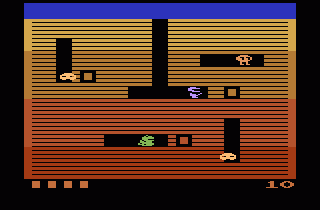 The 5200 version of Dig Dug hit rock with the
first swing of its shovel, but its 2600 counterpart is something any
fan of Namco's arcade hit can dig. Admittedly, it doesn't make
a flattering first impression with its primitive visuals... the
layers of dirt are reduced to flat, multi-colored lines, and in
keeping with that time-honored 2600 tradition, the dragons bear an
uncanny resemblance to ducks. However, the whimsical
soundtrack never misses a beat, and the gameplay strikes gold with
tight control and massive throngs of enemies in the later
stages. There can be up to a dozen Pookas and Fygars on the
screen at once, with only moderate flicker and no skimping on the
artificial intelligence. Loosen a rock and the foes beneath
you will scatter; clear the stage of pests and the lucky survivor
will make a beeline for the exit at the top of the screen.
The 5200 version of Dig Dug hit rock with the
first swing of its shovel, but its 2600 counterpart is something any
fan of Namco's arcade hit can dig. Admittedly, it doesn't make
a flattering first impression with its primitive visuals... the
layers of dirt are reduced to flat, multi-colored lines, and in
keeping with that time-honored 2600 tradition, the dragons bear an
uncanny resemblance to ducks. However, the whimsical
soundtrack never misses a beat, and the gameplay strikes gold with
tight control and massive throngs of enemies in the later
stages. There can be up to a dozen Pookas and Fygars on the
screen at once, with only moderate flicker and no skimping on the
artificial intelligence. Loosen a rock and the foes beneath
you will scatter; clear the stage of pests and the lucky survivor
will make a beeline for the exit at the top of the screen.
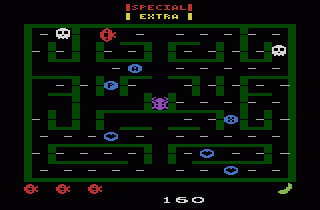 Coleco planned a 2600 port of Ladybug, but its
development was derailed thanks to the video game crash of
1984. However, considering the company's track record, it was
probably for the best. Invariably, Coleco's 2600 titles were
scaled down and comically abstracted... Donkey Kong became Fyvush
Finkel's two stage struggle against giant cheese wheels, and Zaxxon
swapped the sharp isometric graphics of the arcade game with a
blocky behind-the-ship view that made players wonder if someone had
replaced the cartridge while they weren't looking. There's no
telling what kind of twisted monstrocity Coleco would have pawned
off as Ladybug if they had been given a chance!
Coleco planned a 2600 port of Ladybug, but its
development was derailed thanks to the video game crash of
1984. However, considering the company's track record, it was
probably for the best. Invariably, Coleco's 2600 titles were
scaled down and comically abstracted... Donkey Kong became Fyvush
Finkel's two stage struggle against giant cheese wheels, and Zaxxon
swapped the sharp isometric graphics of the arcade game with a
blocky behind-the-ship view that made players wonder if someone had
replaced the cartridge while they weren't looking. There's no
telling what kind of twisted monstrocity Coleco would have pawned
off as Ladybug if they had been given a chance! I love the Atari 5200, but the crummy thing
about owning the system is that it makes arcade conversions for its
little brother seem downright trifling by comparison.
There's no question that it took serious effort to squeeze Moon
Patrol into the tight confines of the 2600 hardware, but it's hard
to appreciate all that hard work when the 5200 game is just a hair
from arcade perfection. After all, why bother for second best
when first best is within reach?
I love the Atari 5200, but the crummy thing
about owning the system is that it makes arcade conversions for its
little brother seem downright trifling by comparison.
There's no question that it took serious effort to squeeze Moon
Patrol into the tight confines of the 2600 hardware, but it's hard
to appreciate all that hard work when the 5200 game is just a hair
from arcade perfection. After all, why bother for second best
when first best is within reach? Remember those
inmates from Guantanemo Bay, who were stripped naked, stacked on top
of each other like anatomically correct Legos, then locked into
interrogation rooms and waterboarded dozens of times? Well, after
you play this game and listen to its shrill, halting rendition of
the Beethoven classic Für Elise, you'll envy their quality
treatment. It's not just the hideous, hideous music in this knockoff
of the Sega puzzle game Columns that will leave you begging for
less. There's also the fact that you can't match gems diagonally, or
in the gravest omission of all, make screen-clearing chain combos.
You can try, but the pieces will just fall into place, making
complete matches that won't vanish until you add a gem to the pile
in the next turn. After seeing what the Atari 2600 could do with
Klax, there's just no excuse for something like this, especially
when you consider that this was the system's last official
release. Thank heavens for homebrew, eh?
Remember those
inmates from Guantanemo Bay, who were stripped naked, stacked on top
of each other like anatomically correct Legos, then locked into
interrogation rooms and waterboarded dozens of times? Well, after
you play this game and listen to its shrill, halting rendition of
the Beethoven classic Für Elise, you'll envy their quality
treatment. It's not just the hideous, hideous music in this knockoff
of the Sega puzzle game Columns that will leave you begging for
less. There's also the fact that you can't match gems diagonally, or
in the gravest omission of all, make screen-clearing chain combos.
You can try, but the pieces will just fall into place, making
complete matches that won't vanish until you add a gem to the pile
in the next turn. After seeing what the Atari 2600 could do with
Klax, there's just no excuse for something like this, especially
when you consider that this was the system's last official
release. Thank heavens for homebrew, eh? Man's innate need to collect has made him
spend obscene amounts of money on frivolous items that do
nothing to justify the expense. Jackson Pollock paintings, pet
rocks, those little red dolls that giggle uncontrollably... all
of these needless things have emptied wallets while offering nothing
in return but the hollow satisfaction of their possession. Air
Raid is another of these silly indulgences, an obscure Atari 2600
release that's currently being auctioned on eBay for a bank-breaking
ten thousand dollars. Yes, that's five figures, ten grand, "I
could have had a V8 and the rest of the damned car for that price!"
territory. What will the "winner" of this auction receive for
his life's savings? A lackluster hybrid of Space Invaders and
Missile Command, along with a cardboard box to
keep this digital dog turd in pristine condition.
Man's innate need to collect has made him
spend obscene amounts of money on frivolous items that do
nothing to justify the expense. Jackson Pollock paintings, pet
rocks, those little red dolls that giggle uncontrollably... all
of these needless things have emptied wallets while offering nothing
in return but the hollow satisfaction of their possession. Air
Raid is another of these silly indulgences, an obscure Atari 2600
release that's currently being auctioned on eBay for a bank-breaking
ten thousand dollars. Yes, that's five figures, ten grand, "I
could have had a V8 and the rest of the damned car for that price!"
territory. What will the "winner" of this auction receive for
his life's savings? A lackluster hybrid of Space Invaders and
Missile Command, along with a cardboard box to
keep this digital dog turd in pristine condition. This game
leaves me incredibly torn. On one hand, it's a huge disservice to a
film as brilliant as Alien to turn it into a futuristic Pac-Man
clone. Even in the technological stone age known as the early 1980s,
game developers could have found better ways to capture the low-key
tension of Ridley Scott's science-fiction epic... Haunted House is
proof enough of that. On the other hand, this is a really, really
good Pac-Man clone; much closer to the real thing than
Atari's official conversion. It's got the twisting, turning
corridors, it's got the howling sirens, and it's even got an
assortment of bonus prizes, each more valuable than the last. Yes,
there are some minor alterations to keep Atari's lawyers at bay, but
they're surprisingly inconsequential. It doesn't matter that there
are forgettable, Frogger-esque bonus stages after every round, or
that there's only one energizer on the screen at a time, or that
Ripley is armed with a flamethrower that may (but usually doesn't)
scare off her pursuers... this is Pac-Man with the Alien license
stapled to it. If you desperately want an alternative to Atari's own
Pac-Man, that's a good thing, but if you were insulted that the
Alien series took a turn for the dumber with James Cameron's
testosterone-soaked sequel, maybe not so much.
This game
leaves me incredibly torn. On one hand, it's a huge disservice to a
film as brilliant as Alien to turn it into a futuristic Pac-Man
clone. Even in the technological stone age known as the early 1980s,
game developers could have found better ways to capture the low-key
tension of Ridley Scott's science-fiction epic... Haunted House is
proof enough of that. On the other hand, this is a really, really
good Pac-Man clone; much closer to the real thing than
Atari's official conversion. It's got the twisting, turning
corridors, it's got the howling sirens, and it's even got an
assortment of bonus prizes, each more valuable than the last. Yes,
there are some minor alterations to keep Atari's lawyers at bay, but
they're surprisingly inconsequential. It doesn't matter that there
are forgettable, Frogger-esque bonus stages after every round, or
that there's only one energizer on the screen at a time, or that
Ripley is armed with a flamethrower that may (but usually doesn't)
scare off her pursuers... this is Pac-Man with the Alien license
stapled to it. If you desperately want an alternative to Atari's own
Pac-Man, that's a good thing, but if you were insulted that the
Alien series took a turn for the dumber with James Cameron's
testosterone-soaked sequel, maybe not so much. You don't usually think of 2600 games as being
intense, but this one... oh, man. Give it a few rounds and
you'll be sweating bullets, desperately fighting to stay alive
against an endless assault of aliens, bullets, and
meteors. Beamrider plays a little like Tempest, but the
enemies are a whole lot smarter, dancing around your shots and
pelting you with their own before quickly retreating back to the
horizon. Don't take that breath just yet, though. There
are plenty of other obstacles raining down on
you which block your fire and restrict your movement,
making a tough game even more demanding. Beamrider on the 2600
may not look as polished as the other versions of the game, but
that's to be expected... they were all released for more powerful
systems. What's important is that the gameplay is just as
good- and intense!- on the 2600 as it is anywhere else.
You don't usually think of 2600 games as being
intense, but this one... oh, man. Give it a few rounds and
you'll be sweating bullets, desperately fighting to stay alive
against an endless assault of aliens, bullets, and
meteors. Beamrider plays a little like Tempest, but the
enemies are a whole lot smarter, dancing around your shots and
pelting you with their own before quickly retreating back to the
horizon. Don't take that breath just yet, though. There
are plenty of other obstacles raining down on
you which block your fire and restrict your movement,
making a tough game even more demanding. Beamrider on the 2600
may not look as polished as the other versions of the game, but
that's to be expected... they were all released for more powerful
systems. What's important is that the gameplay is just as
good- and intense!- on the 2600 as it is anywhere else. You'd heard of
the low-fat margarine I Can't Believe It's Not Butter, right? Well,
just one taste of this predictably lackluster M Network release and
you'll exclaim, "I Can't Believe It IS Burgertime!" At least it's
got all the basics covered... the familiar theme music still drones
in the background (although it loses a lot of its charm when piped
through the 2600 sound processor...) and you're still chased by all
the renegade food items from the arcade game, including Mr. Hot Dog,
Mr. Yellow Stick, and... uh, Mr. Red Wafer. Wait, colorful wafers?
This isn't Burgertime... it's Soylent Green, the video game! It
becomes clear after a few rounds of getting stuck on ladders and
stepping on burger toppings disguised as rectangles that this game
is made of very disgruntled people. Like the rest of M Network's
cavalcade of crap, the sense of resentment in its design is
palpable. You can almost see the designers at Mattel huddled around
a table, complaining, "Aw crap, didn't we just design this for the
Intellivision? All right Ronny, bang out some code in a couple of
hours so we can get the marketing team off our backs. Wait, is that
thing supposed to be Peter Pepper? Whatever. When you're done, we'll
clock out early and head down to the local nudie
bar."
You'd heard of
the low-fat margarine I Can't Believe It's Not Butter, right? Well,
just one taste of this predictably lackluster M Network release and
you'll exclaim, "I Can't Believe It IS Burgertime!" At least it's
got all the basics covered... the familiar theme music still drones
in the background (although it loses a lot of its charm when piped
through the 2600 sound processor...) and you're still chased by all
the renegade food items from the arcade game, including Mr. Hot Dog,
Mr. Yellow Stick, and... uh, Mr. Red Wafer. Wait, colorful wafers?
This isn't Burgertime... it's Soylent Green, the video game! It
becomes clear after a few rounds of getting stuck on ladders and
stepping on burger toppings disguised as rectangles that this game
is made of very disgruntled people. Like the rest of M Network's
cavalcade of crap, the sense of resentment in its design is
palpable. You can almost see the designers at Mattel huddled around
a table, complaining, "Aw crap, didn't we just design this for the
Intellivision? All right Ronny, bang out some code in a couple of
hours so we can get the marketing team off our backs. Wait, is that
thing supposed to be Peter Pepper? Whatever. When you're done, we'll
clock out early and head down to the local nudie
bar." If there's one thing this game isn't,
it's a cakewalk! As a lanky pastry chef, you've got to catch
freshly baked desserts rolling down a series of conveyor
belts. These range from ornate three layer wedding cakes to
animated gingerbread men who aren't too thrilled with the prospect
of being shipped off to hungry kids. Things get pretty frantic
when the belts are switched to Lucy speed, but you've got one ace up
your sleeve... one of the belts can be temporarily stopped, giving
you a chance to catch cakes that would otherwise find their way to
the floor. Even with this advantage, you're going to find
yourself making a lot of messes... unlike Pressure Cooker or Tapper,
which always gave you a way out of a desperate situation, Cakewalk
tends to keep the treats at such a distance from each other that you
can't possibly rescue them all. Luckily, the excellent
graphics (including a tiny janitor who sweeps away your mistakes)
make it tough to complain when the game starts playing
dirty.
If there's one thing this game isn't,
it's a cakewalk! As a lanky pastry chef, you've got to catch
freshly baked desserts rolling down a series of conveyor
belts. These range from ornate three layer wedding cakes to
animated gingerbread men who aren't too thrilled with the prospect
of being shipped off to hungry kids. Things get pretty frantic
when the belts are switched to Lucy speed, but you've got one ace up
your sleeve... one of the belts can be temporarily stopped, giving
you a chance to catch cakes that would otherwise find their way to
the floor. Even with this advantage, you're going to find
yourself making a lot of messes... unlike Pressure Cooker or Tapper,
which always gave you a way out of a desperate situation, Cakewalk
tends to keep the treats at such a distance from each other that you
can't possibly rescue them all. Luckily, the excellent
graphics (including a tiny janitor who sweeps away your mistakes)
make it tough to complain when the game starts playing
dirty. Another terrific arcade translation, this time
by the folks at Sega. There's only two rounds, but both of them are
so well done that you probably won't miss Rhino Ridge (which was
incredibly frustrating on the ColecoVision anyways). And oh, the
second round's been changed to accommodate the 2600's limitations
(it's not isometric like the first round and plays a little more
like Frogger), but the programmers made up for this by making it
breathtakingly colorful. And did I mention the solid control and
cute end-of-level intermission that were both missing from the
ColecoVision version? Well, I did now. In any case, this is worth
having.
Another terrific arcade translation, this time
by the folks at Sega. There's only two rounds, but both of them are
so well done that you probably won't miss Rhino Ridge (which was
incredibly frustrating on the ColecoVision anyways). And oh, the
second round's been changed to accommodate the 2600's limitations
(it's not isometric like the first round and plays a little more
like Frogger), but the programmers made up for this by making it
breathtakingly colorful. And did I mention the solid control and
cute end-of-level intermission that were both missing from the
ColecoVision version? Well, I did now. In any case, this is worth
having. It may say "Fox" on the box, but it certainly
doesn't look like one of their games! The
gorgeous sunset in the background and the silky smooth animation of
the sealife are on par with Activision's best work.
However, the gameplay of Crash Dive is less surprising... it's
just your typical side-scrolling shooter, using the promise of
sunken treasure as its hook. Every prize you collect
reveals another glittering golden artifact more valuable than the
last, the same incentive that kept Pac-Man
players dropping in quarters to get a peek at the fruit
targets in the later stages. The treasures make
Crash Dive more addictive than it otherwise would have been, and
make its flaws (including predictable enemies and a dive animation
that briefly hides the player's ship) easier to
swallow.
It may say "Fox" on the box, but it certainly
doesn't look like one of their games! The
gorgeous sunset in the background and the silky smooth animation of
the sealife are on par with Activision's best work.
However, the gameplay of Crash Dive is less surprising... it's
just your typical side-scrolling shooter, using the promise of
sunken treasure as its hook. Every prize you collect
reveals another glittering golden artifact more valuable than the
last, the same incentive that kept Pac-Man
players dropping in quarters to get a peek at the fruit
targets in the later stages. The treasures make
Crash Dive more addictive than it otherwise would have been, and
make its flaws (including predictable enemies and a dive animation
that briefly hides the player's ship) easier to
swallow.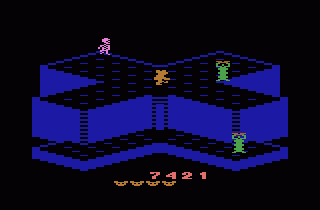 You couldn't expect an arcade-perfect
translation of this complex isometric maze game on the 2600, but
you've got to give the designers credit for trying... This certainly
feels like the coin-op, and the title character (who scores
high on the cute meter, a big plus for me) scurries around almost as
if you're controlling him with a trackball. The mazes are blocky,
and there's a lot of flicker, but that's forgivable since there are
so many rounds and the characters are so nicely detailed (especially
the gem eaters! Wow!). The play mechanics are pretty complex for a
2600 game, too, which is always a plus. HIGHLY
recommended.
You couldn't expect an arcade-perfect
translation of this complex isometric maze game on the 2600, but
you've got to give the designers credit for trying... This certainly
feels like the coin-op, and the title character (who scores
high on the cute meter, a big plus for me) scurries around almost as
if you're controlling him with a trackball. The mazes are blocky,
and there's a lot of flicker, but that's forgivable since there are
so many rounds and the characters are so nicely detailed (especially
the gem eaters! Wow!). The play mechanics are pretty complex for a
2600 game, too, which is always a plus. HIGHLY
recommended.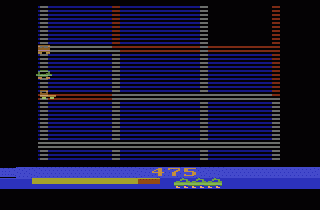 Funny how such
a clever concept could result in such a terminally dull game. As a
dime-store knock-off of that famous
Funny how such
a clever concept could result in such a terminally dull game. As a
dime-store knock-off of that famous  Zaxxon fans will be delighted to know that
Desert Falcon is much closer to Sega's arcade classic than Coleco's
own 2600 version of Zaxxon, and the sound is absolutely astounding.
Unfortunately, the gameplay is severely limited... there's never
more than one enemy onscreen for the majority of the game, and
there's no artificial intelligence to speak of: even the mighty
Sphinx is easily destroyed once you find his soft spot. The graphics
are pretty blocky, too (yes, even by 2600 standards!), but that's
offset somewhat by the excellent animation of the title character
(your falcon flaps its wings with admirable realism, and when it
hops along the ground to pick up items you're instantly reminded of
the crow from those old Warner Bros. cartoons) and the smoothly
scrolling backgrounds. Another point of note: this is one of the few
2600 games with actual power ups! Pick up three hieroglyphs in the
correct sequence and you're rewarded with everything from faster
shots to invincibility to a smart bomb (not that this comes in handy
since there are never enough enemies onscreen to warrant its
use...). Each ability is mentioned briefly, and if necessary, the
game will actually instruct you to double click your fire button to
activate it! This feature is a real lifesaver, especially when you
don't have a copy of the instructions... Anyways, Desert Falcon is
worth the price of admission, if just to hear your humble 2600 kick
out some of the funkiest Egyptian tunes since Raiders of the Lost
Ark. I'd recommend the 7800 version if you want actual gameplay to
go with your great music, though.
Zaxxon fans will be delighted to know that
Desert Falcon is much closer to Sega's arcade classic than Coleco's
own 2600 version of Zaxxon, and the sound is absolutely astounding.
Unfortunately, the gameplay is severely limited... there's never
more than one enemy onscreen for the majority of the game, and
there's no artificial intelligence to speak of: even the mighty
Sphinx is easily destroyed once you find his soft spot. The graphics
are pretty blocky, too (yes, even by 2600 standards!), but that's
offset somewhat by the excellent animation of the title character
(your falcon flaps its wings with admirable realism, and when it
hops along the ground to pick up items you're instantly reminded of
the crow from those old Warner Bros. cartoons) and the smoothly
scrolling backgrounds. Another point of note: this is one of the few
2600 games with actual power ups! Pick up three hieroglyphs in the
correct sequence and you're rewarded with everything from faster
shots to invincibility to a smart bomb (not that this comes in handy
since there are never enough enemies onscreen to warrant its
use...). Each ability is mentioned briefly, and if necessary, the
game will actually instruct you to double click your fire button to
activate it! This feature is a real lifesaver, especially when you
don't have a copy of the instructions... Anyways, Desert Falcon is
worth the price of admission, if just to hear your humble 2600 kick
out some of the funkiest Egyptian tunes since Raiders of the Lost
Ark. I'd recommend the 7800 version if you want actual gameplay to
go with your great music, though.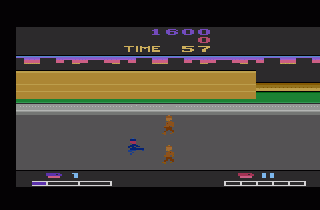 There's
something strangely fascinating about watching a 1986 arcade game
running on 1977 hardware. It just shouldn't be happening, yet for
better or worse, there it is! Like the Hong Kong Street Fighter
clones on the NES, or Virtua Fighter 2 on the Genesis, or Far Cry on
the Wii, Double Dragon on the Atari 2600 represents an almost
insurmountable challenge for the team that designed it. They get
plenty of credit for nailing the graphics and sound... thanks to the
colorful, detailed backgrounds, there's no mistaking this game for
anything other than Double Dragon. In fact, the incessant and
incredibly obnoxious soundtrack will never let you forget
it! Unfortunately, something had to give in this overreaching
conversion of the Technos arcade classic, and that something was the
gameplay. The 2600's single button joystick is one button short of
providing the full arcade experience, so a lot of moves either have
to be accessed through awkward joystick motions or were removed
completely (oh man, not the throws!). The outcomes of the fights are
also frustratingly random; so much so that it would be hard to
imagine anyone finishing the game with the paltry three lives and
zero continues they're given. The developers had high hopes for this
one, but Double Dragon on the 2600 is more a proof of concept than a
full-fledged game.
There's
something strangely fascinating about watching a 1986 arcade game
running on 1977 hardware. It just shouldn't be happening, yet for
better or worse, there it is! Like the Hong Kong Street Fighter
clones on the NES, or Virtua Fighter 2 on the Genesis, or Far Cry on
the Wii, Double Dragon on the Atari 2600 represents an almost
insurmountable challenge for the team that designed it. They get
plenty of credit for nailing the graphics and sound... thanks to the
colorful, detailed backgrounds, there's no mistaking this game for
anything other than Double Dragon. In fact, the incessant and
incredibly obnoxious soundtrack will never let you forget
it! Unfortunately, something had to give in this overreaching
conversion of the Technos arcade classic, and that something was the
gameplay. The 2600's single button joystick is one button short of
providing the full arcade experience, so a lot of moves either have
to be accessed through awkward joystick motions or were removed
completely (oh man, not the throws!). The outcomes of the fights are
also frustratingly random; so much so that it would be hard to
imagine anyone finishing the game with the paltry three lives and
zero continues they're given. The developers had high hopes for this
one, but Double Dragon on the 2600 is more a proof of concept than a
full-fledged game. Although I must admit that this is better than
any of Data Age's other releases, Frankenstein's Monster is still
lacking in several critical areas. With only one three story screen,
FM isn't nearly as varied as its obvious inspiration Pitfall!, and
the frustrating gameplay is a minus as well... spiders drop from the
ceiling of the basement floor without warning, often ruining
otherwise perfectly-timed jumps, and wading through the hordes of
bat-like creatures on your way to Frankenstein himself becomes
tiresome quickly. The graphics are fair (and appropriately creepy)
and the sound effects are tolerable (which is a miracle in itself
considering that this is a Data Age title), but I still wouldn't
recommend this over either of David Crane's Pitfall!
adventures.
Although I must admit that this is better than
any of Data Age's other releases, Frankenstein's Monster is still
lacking in several critical areas. With only one three story screen,
FM isn't nearly as varied as its obvious inspiration Pitfall!, and
the frustrating gameplay is a minus as well... spiders drop from the
ceiling of the basement floor without warning, often ruining
otherwise perfectly-timed jumps, and wading through the hordes of
bat-like creatures on your way to Frankenstein himself becomes
tiresome quickly. The graphics are fair (and appropriately creepy)
and the sound effects are tolerable (which is a miracle in itself
considering that this is a Data Age title), but I still wouldn't
recommend this over either of David Crane's Pitfall!
adventures.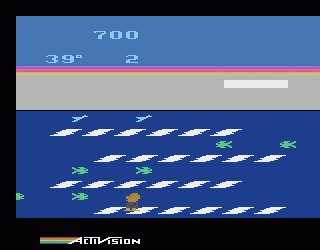 This incredibly disappointing Activision
release is sort of a hybrid of Frogger and Q*Bert, and while it's
more attractive than either (well, the 2600 versions of either,
anyways), it's certainly no more enjoyable. As an Arctic explorer,
you must hop on rows of ice floes, changing the colors of each, to
build an igloo which will eventually protect you from the elements.
Canada geese, Alaskan King crabs, clams, and other things that would
taste great in a chowder patrol the freezing waters and threaten to
push your insipid, er, intrepid explorer into the deadly
drink. And wouldn't you know it, it's nearly impossible to avoid
being shoved into the ocean by these unassuming threats once you've
built your first igloo. Lovely. The artwork is pretty decent by 2600
standards (although not by Activision stardards) but that doesn't
change the fact that the game is unplayably
frustrating.
This incredibly disappointing Activision
release is sort of a hybrid of Frogger and Q*Bert, and while it's
more attractive than either (well, the 2600 versions of either,
anyways), it's certainly no more enjoyable. As an Arctic explorer,
you must hop on rows of ice floes, changing the colors of each, to
build an igloo which will eventually protect you from the elements.
Canada geese, Alaskan King crabs, clams, and other things that would
taste great in a chowder patrol the freezing waters and threaten to
push your insipid, er, intrepid explorer into the deadly
drink. And wouldn't you know it, it's nearly impossible to avoid
being shoved into the ocean by these unassuming threats once you've
built your first igloo. Lovely. The artwork is pretty decent by 2600
standards (although not by Activision stardards) but that doesn't
change the fact that the game is unplayably
frustrating.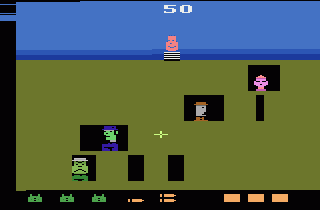 Before
Hogan's Alley, and before light guns, there was Gangster Alley.
Here's a game that was quite literally ahead of its time, since it
was released years before a proper peripheral was available for it.
Just like Game B of Hogan's Alley, random characters peek out from
behind the windows of a run-down slum, and it's up to you to pick
off the thugs while sparing the innocent civilians. However, since
you're armed with a joystick-guided cursor instead of a firearm, the
gameplay has been slowed down to accommodate your less than
lightning-fast reflexes, making this incredibly forward thinking
game incredibly boring. That's a shame, because this release could
have been pretty enjoyable with the right equipment, even if the
hardened criminals look like cast-off Muppets and there's not much
in the way of variety.
Before
Hogan's Alley, and before light guns, there was Gangster Alley.
Here's a game that was quite literally ahead of its time, since it
was released years before a proper peripheral was available for it.
Just like Game B of Hogan's Alley, random characters peek out from
behind the windows of a run-down slum, and it's up to you to pick
off the thugs while sparing the innocent civilians. However, since
you're armed with a joystick-guided cursor instead of a firearm, the
gameplay has been slowed down to accommodate your less than
lightning-fast reflexes, making this incredibly forward thinking
game incredibly boring. That's a shame, because this release could
have been pretty enjoyable with the right equipment, even if the
hardened criminals look like cast-off Muppets and there's not much
in the way of variety. I didn't appreciate this game as a teenager,
but now I understand that it was unrealistic to expect a perfect
conversion of Gyruss on the Atari 2600. Parker Bros.
did the best they could with what they had, and given
the limitations of the system, they did pretty well. The
control is every bit as sharp as it was in the arcade game, with
your ship gliding smoothly along the edges of the screen, and much
of the gameplay has been perfectly preserved, from the challenge
stages to the satellites which double your firepower. There's
even a planet waiting for you at the end of each set of stages, a
small but nevertheless welcome detail which demonstrates
that the developers went the extra mile in bringing the arcade
experience home. On the down side, Gyruss suffers from
indistinct graphics and the same limited field of vision that held
back its cousin on the Atari 5200. Your ship is much too close
to the center of the playfield, putting it in constant danger of
being demolished by the heat-seeking meteors that stream out of the
horizon in the game's later stages. Also, the sound effects
have been removed completely, but that's no great loss when you
consider the rockin' Bach soundtrack that replaced them.
I didn't appreciate this game as a teenager,
but now I understand that it was unrealistic to expect a perfect
conversion of Gyruss on the Atari 2600. Parker Bros.
did the best they could with what they had, and given
the limitations of the system, they did pretty well. The
control is every bit as sharp as it was in the arcade game, with
your ship gliding smoothly along the edges of the screen, and much
of the gameplay has been perfectly preserved, from the challenge
stages to the satellites which double your firepower. There's
even a planet waiting for you at the end of each set of stages, a
small but nevertheless welcome detail which demonstrates
that the developers went the extra mile in bringing the arcade
experience home. On the down side, Gyruss suffers from
indistinct graphics and the same limited field of vision that held
back its cousin on the Atari 5200. Your ship is much too close
to the center of the playfield, putting it in constant danger of
being demolished by the heat-seeking meteors that stream out of the
horizon in the game's later stages. Also, the sound effects
have been removed completely, but that's no great loss when you
consider the rockin' Bach soundtrack that replaced them. Yes, it's based on the cornball Filmation
cartoon, but we won't hold that against it. In fact, the tie-in with
He-Man is part of this otherwise average shooter's charm... the game
greets you with a really neat morphing sequence loosely based on the
one in the cartoon, and if you're lucky enough to beat Skeletor in a
somewhat anticlimactic end of level confrontation, you're treated to
a huge picture of He-Man standing victorious with his sword held
high. If only the cake were as delicious as the icing... it's just
your basic side-scrolling shooter, similar to Fox's Mega Force but
with better, less flickery graphics. Once you reach Skeletor's
castle, the perspective changes, and you must now tag the fiend
while deflecting his energy bolts with your sword and squeezing
between the gaps in his twin force fields. Pretty basic stuff,
really, although to the author's credit it is fairly well
done. Bottom line: He-Man is definitely worth the purchase if you
can find it for a few bucks at a garage sale or pawn shop, but don't
bother with it if you have to order it from a game dealer or own an
Intellivision (as its version of He-Man is better).
Yes, it's based on the cornball Filmation
cartoon, but we won't hold that against it. In fact, the tie-in with
He-Man is part of this otherwise average shooter's charm... the game
greets you with a really neat morphing sequence loosely based on the
one in the cartoon, and if you're lucky enough to beat Skeletor in a
somewhat anticlimactic end of level confrontation, you're treated to
a huge picture of He-Man standing victorious with his sword held
high. If only the cake were as delicious as the icing... it's just
your basic side-scrolling shooter, similar to Fox's Mega Force but
with better, less flickery graphics. Once you reach Skeletor's
castle, the perspective changes, and you must now tag the fiend
while deflecting his energy bolts with your sword and squeezing
between the gaps in his twin force fields. Pretty basic stuff,
really, although to the author's credit it is fairly well
done. Bottom line: He-Man is definitely worth the purchase if you
can find it for a few bucks at a garage sale or pawn shop, but don't
bother with it if you have to order it from a game dealer or own an
Intellivision (as its version of He-Man is better).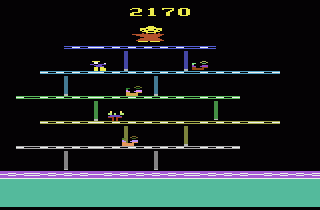 ZiMAG was never going to win any awards
for the quality of its games, but I Want My Mommy is the best of
this rotten bunch. It's a kid-friendly alternative to the
brutally difficult Donkey Kong series, with just four
enemies in each stage and a cuddly lead character who's a
lot less frightening than Mario before his late 1980s marketing
makeover. You'll guide your fuzzy hero up a series of
platforms, first planting a pair of poles and then climbing one of
them to the next floor. Strange creatures pursue the
plucky teddy bear on the higher platforms, but can be clobbered
after he grabs a floating kiss from his mother. Finish the
first stage and the bear is rewarded with a giant apple... complete
the second and he's reunited with his mom, who looks like a Lego man
struggling to escape a zipped up sleeping bag. Okay, so the
graphics aren't mindblowing, but they're suitably colorful for
the game's young audience, and the action will hold even
an adult's attention for the five minutes it will take to reach
Mommy.
ZiMAG was never going to win any awards
for the quality of its games, but I Want My Mommy is the best of
this rotten bunch. It's a kid-friendly alternative to the
brutally difficult Donkey Kong series, with just four
enemies in each stage and a cuddly lead character who's a
lot less frightening than Mario before his late 1980s marketing
makeover. You'll guide your fuzzy hero up a series of
platforms, first planting a pair of poles and then climbing one of
them to the next floor. Strange creatures pursue the
plucky teddy bear on the higher platforms, but can be clobbered
after he grabs a floating kiss from his mother. Finish the
first stage and the bear is rewarded with a giant apple... complete
the second and he's reunited with his mom, who looks like a Lego man
struggling to escape a zipped up sleeping bag. Okay, so the
graphics aren't mindblowing, but they're suitably colorful for
the game's young audience, and the action will hold even
an adult's attention for the five minutes it will take to reach
Mommy.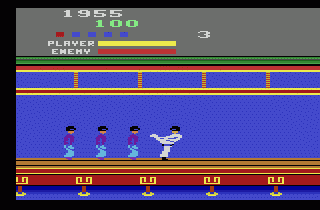 There aren't
many martial arts titles on the Atari 2600, mostly because the
subject didn't really catch fire with Americans until 1984's
surprise hit The Karate Kid but also because the massive
characters and complex play mechanics of fighting games demand a
higher octane console. With that in mind, it was pretty ballsy of
Activision to attempt this conversion of the Irem arcade game Kung
Fu Master... and impressive that they were able to reproduce the
original so accurately. Granted, it doesn't hold a candle to the
version that Nintendo released around the same time, but if you
hadn't yet stepped up to the big leagues of the NES, you could learn
to live with the slightly kludgy controls and knife-throwers who
look disconcertingly like trenchcoat-clad flashers. What's important
is that all five stages are intact, including the pottery barn of
doom and the hatchery filled with fearsome (?) poison moths. The
game runs at a pretty brisk clip as well, a pleasant surprise after
similar Atari 2600 efforts like Chuck Norris Superkicks and
Activision's less successful port of Double Dragon.
There aren't
many martial arts titles on the Atari 2600, mostly because the
subject didn't really catch fire with Americans until 1984's
surprise hit The Karate Kid but also because the massive
characters and complex play mechanics of fighting games demand a
higher octane console. With that in mind, it was pretty ballsy of
Activision to attempt this conversion of the Irem arcade game Kung
Fu Master... and impressive that they were able to reproduce the
original so accurately. Granted, it doesn't hold a candle to the
version that Nintendo released around the same time, but if you
hadn't yet stepped up to the big leagues of the NES, you could learn
to live with the slightly kludgy controls and knife-throwers who
look disconcertingly like trenchcoat-clad flashers. What's important
is that all five stages are intact, including the pottery barn of
doom and the hatchery filled with fearsome (?) poison moths. The
game runs at a pretty brisk clip as well, a pleasant surprise after
similar Atari 2600 efforts like Chuck Norris Superkicks and
Activision's less successful port of Double Dragon.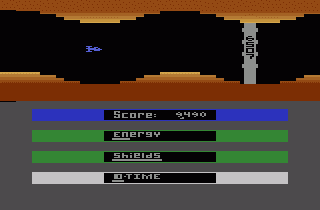 As a video game
critic, I've reviewed plenty of software that wasn't up to snuff,
but occasionally, a game will turn the tables and leave me
feeling inadequate. Imagic's Laser Gates is a prime example... it's
not only one of the best shooters on the Atari 2600, but also one of
the toughest. As you fly through a cramped cavern in your sleek
space cruiser, you'll not only face the eponymous laser gates but
concrete walls, armed satellite dishes, hungry aliens, and even the
2600's own brain in a desperate and increasingly hopeless
battle for survival. The further you advance, the thicker the walls
and the faster the gaps in the laser gates become, leaving you
crossing your fingers for the next precious fuel pod that will keep
you in the game for just a few minutes longer. The graphics and
sound are trademark Imagic, with enemies exploding into showers of
cosmic confetti and the snarling sound effects for each trap
ratcheting up the tension. However, it's the unrelenting challenge
of Laser Gates that ultimately makes the game a winner...
and the player a loser. Frequently.
As a video game
critic, I've reviewed plenty of software that wasn't up to snuff,
but occasionally, a game will turn the tables and leave me
feeling inadequate. Imagic's Laser Gates is a prime example... it's
not only one of the best shooters on the Atari 2600, but also one of
the toughest. As you fly through a cramped cavern in your sleek
space cruiser, you'll not only face the eponymous laser gates but
concrete walls, armed satellite dishes, hungry aliens, and even the
2600's own brain in a desperate and increasingly hopeless
battle for survival. The further you advance, the thicker the walls
and the faster the gaps in the laser gates become, leaving you
crossing your fingers for the next precious fuel pod that will keep
you in the game for just a few minutes longer. The graphics and
sound are trademark Imagic, with enemies exploding into showers of
cosmic confetti and the snarling sound effects for each trap
ratcheting up the tension. However, it's the unrelenting challenge
of Laser Gates that ultimately makes the game a winner...
and the player a loser. Frequently.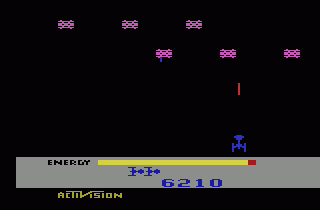 Hostile hamburgers? Belligerant
bowties? Sinister steam irons? It can only be Megamania,
the first shooter with the guts to poke fun at the genre and the
best game of its kind on the Atari 2600. Long before
Paradious, Game Paradise, or the dreaded Cho Aniki, Megamania was
making gamers laugh with the wackiest foes in the universe, while
testing their skills with mesmerizing flight patterns that were
hard to survive and even tougher to outsmart. Twenty five
years later, the game is every bit as awesome as it was in the early
1980s... even if the visuals are a notch below the usual Activision
output. All that detail went into the 5200 version of
Megamania, but the lightning-fast action is right here, baby!
You'll pick off dancing formations of radial tires and diamond
rings, struggling to annihilate the unlikely foes before
your fuel supply runs dry. Then once those nasty irons
steamclean your clock and you've run out of lives, you'll
scramble for the reset button and another chance to play... because
with Megamania, once is never enough!
Hostile hamburgers? Belligerant
bowties? Sinister steam irons? It can only be Megamania,
the first shooter with the guts to poke fun at the genre and the
best game of its kind on the Atari 2600. Long before
Paradious, Game Paradise, or the dreaded Cho Aniki, Megamania was
making gamers laugh with the wackiest foes in the universe, while
testing their skills with mesmerizing flight patterns that were
hard to survive and even tougher to outsmart. Twenty five
years later, the game is every bit as awesome as it was in the early
1980s... even if the visuals are a notch below the usual Activision
output. All that detail went into the 5200 version of
Megamania, but the lightning-fast action is right here, baby!
You'll pick off dancing formations of radial tires and diamond
rings, struggling to annihilate the unlikely foes before
your fuel supply runs dry. Then once those nasty irons
steamclean your clock and you've run out of lives, you'll
scramble for the reset button and another chance to play... because
with Megamania, once is never enough!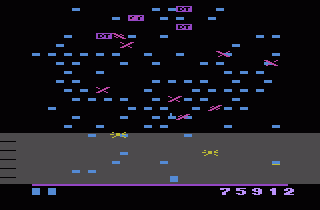 "Insanely
good" would be the best way to describe this port of the Atari
arcade game that took the fast, frantic action of Centipede to the
next level. The cast of characters from the original has been
greatly expanded, with hypnotically swaying bees, screen choking
mosquitoes, and bullet time inducing inchworms joining the armies of
spiders and cent-er, millipedes. The oppressive swarm of bugs is
truly a sight to behold on the Atari 2600, especially in the
challenge stages, where the playfield is beseiged by enough pests to
give even the Orkin man a heart attack. Some sacrifices had to be
made to achieve this level of unrelenting intensity, of course...
the graphics have been scaled down to the point where your ship is a
square and the mushrooms no longer take visible damage, making it
tough to effectively use the DDT canisters at the top of the screen.
However, the game controls beautifully, with just enough inertia to
simulate the feel of a trackball without sending the player
helplessly careening into one of those obnoxious spiders. It also
sounds a whole lot like the arcade version, although the
ear-splitting screech you'll hear when you lose a life will leave
you wondering if that's a plus. It may not have the visual polish of
Crystal Castles, but Millipede is one of the most satisfying arcade
conversions on the Atari 2600... to say nothing of the most
thrilling!
"Insanely
good" would be the best way to describe this port of the Atari
arcade game that took the fast, frantic action of Centipede to the
next level. The cast of characters from the original has been
greatly expanded, with hypnotically swaying bees, screen choking
mosquitoes, and bullet time inducing inchworms joining the armies of
spiders and cent-er, millipedes. The oppressive swarm of bugs is
truly a sight to behold on the Atari 2600, especially in the
challenge stages, where the playfield is beseiged by enough pests to
give even the Orkin man a heart attack. Some sacrifices had to be
made to achieve this level of unrelenting intensity, of course...
the graphics have been scaled down to the point where your ship is a
square and the mushrooms no longer take visible damage, making it
tough to effectively use the DDT canisters at the top of the screen.
However, the game controls beautifully, with just enough inertia to
simulate the feel of a trackball without sending the player
helplessly careening into one of those obnoxious spiders. It also
sounds a whole lot like the arcade version, although the
ear-splitting screech you'll hear when you lose a life will leave
you wondering if that's a plus. It may not have the visual polish of
Crystal Castles, but Millipede is one of the most satisfying arcade
conversions on the Atari 2600... to say nothing of the most
thrilling! Hear that
ringing? It's TigerVision, phoning in yet another 2600 conversion of
a hot computer game. They've split this release into two volumes,
much like NEC had with the PC Engine version of R-Type, but don't be
fooled into thinking that this was due to any earnest effort on
their part. The basic structure of the rounds is intact in both
cartridges, but the production values have been dropped through the
floor. Bounty Bob has been reduced to a charmless, stiffly animated
robot, and the gameplay that was already slow on other systems has
been shifted into neutral. Grating sound effects and a jump that
can't quite vault Bob over the roving mutants in each level offer
further proof that sometimes, just good enough just isn't good
enough.
Hear that
ringing? It's TigerVision, phoning in yet another 2600 conversion of
a hot computer game. They've split this release into two volumes,
much like NEC had with the PC Engine version of R-Type, but don't be
fooled into thinking that this was due to any earnest effort on
their part. The basic structure of the rounds is intact in both
cartridges, but the production values have been dropped through the
floor. Bounty Bob has been reduced to a charmless, stiffly animated
robot, and the gameplay that was already slow on other systems has
been shifted into neutral. Grating sound effects and a jump that
can't quite vault Bob over the roving mutants in each level offer
further proof that sometimes, just good enough just isn't good
enough.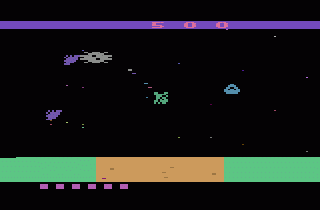 Some things just shouldn't be. You know,
like three legged ducks, or two headed turtles, or The Price is
Right hosted by Rosie O'Donnell. This is just another one of
those affronts to nature; an overreaching conversion of Bosconian
for the Atari 2600. Bosconian was one of the lesser-known
games from the Namco hit machine of the early 1980s; a search
and destroy mission set in the depths of space. On the 2600,
however, it's a seizure-inducing dogpile of flickery, eternally
confused enemies. They stumble around the screen blindly,
hoping to collide with the player... and often do in the later
stages, where they become too fast and numerous to
avoid. Bit Corporation gets points for ambition, but the
futility of porting such an advanced arcade game
to 1970s technology doomed this mission to failure.
Some things just shouldn't be. You know,
like three legged ducks, or two headed turtles, or The Price is
Right hosted by Rosie O'Donnell. This is just another one of
those affronts to nature; an overreaching conversion of Bosconian
for the Atari 2600. Bosconian was one of the lesser-known
games from the Namco hit machine of the early 1980s; a search
and destroy mission set in the depths of space. On the 2600,
however, it's a seizure-inducing dogpile of flickery, eternally
confused enemies. They stumble around the screen blindly,
hoping to collide with the player... and often do in the later
stages, where they become too fast and numerous to
avoid. Bit Corporation gets points for ambition, but the
futility of porting such an advanced arcade game
to 1970s technology doomed this mission to failure. Convinced that it would be a smash hit, CBS
Games was determined to bring Mountain King to every video
game console known to man. It's easy to understand their
enthusiasm for the game once you've played the Atari 5200 version,
but it's harder to get excited about its 2600 counterpart.
While it's certainly recognizable as Mountain King, much of
the magic that made the 5200 game so thrilling has been
stripped away. Choppy scrolling takes the spring out of the
lead character's step, clusters of diamonds are set so far
apart that it takes forever to collect enough to summon the
fire spirit, and the Edvard Grieg soundtrack hits a few sour
notes after you've retrieved the crown. Nevertheless, if an
Atari 2600 was all you had in the early 1980s, a taste of Mountain
King's massive playfield and clever, music-dependent gameplay
was better than nothing at all.
Convinced that it would be a smash hit, CBS
Games was determined to bring Mountain King to every video
game console known to man. It's easy to understand their
enthusiasm for the game once you've played the Atari 5200 version,
but it's harder to get excited about its 2600 counterpart.
While it's certainly recognizable as Mountain King, much of
the magic that made the 5200 game so thrilling has been
stripped away. Choppy scrolling takes the spring out of the
lead character's step, clusters of diamonds are set so far
apart that it takes forever to collect enough to summon the
fire spirit, and the Edvard Grieg soundtrack hits a few sour
notes after you've retrieved the crown. Nevertheless, if an
Atari 2600 was all you had in the early 1980s, a taste of Mountain
King's massive playfield and clever, music-dependent gameplay
was better than nothing at all. This little-seen Avalon Hill release combines
the time-based slaloming of Activision's Sky Jinks with the careful
thrusting of Atari arcade hits like Lunar Lander and
Asteroids. You've got to weave through a series of space
buoys, pop a dozen randomly placed space balloons, then park your
space ship inside a space station, where you can take a break
at the space diner and get yourself the space soup or the space
special. Hint... don't order the
This little-seen Avalon Hill release combines
the time-based slaloming of Activision's Sky Jinks with the careful
thrusting of Atari arcade hits like Lunar Lander and
Asteroids. You've got to weave through a series of space
buoys, pop a dozen randomly placed space balloons, then park your
space ship inside a space station, where you can take a break
at the space diner and get yourself the space soup or the space
special. Hint... don't order the 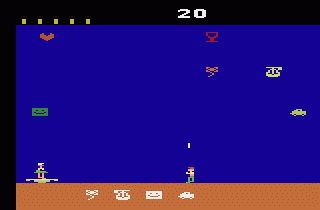 Before Joe Millionaire and Mr. Personality,
there was Pick Up. Oh wait, no there wasn't! Before
Rupert Murdoch was calling the shots, 20th Century Fox still had
some of its dignity left and decided to pass on releasing this
viscivious video game. In Pick Up, you aim
to satisfy your manly urges by collecting what a girl wants (by
shooting at it...?), then luring the nearest comely lass to a
hotel. You can guess what comes next... in fact, you'll have
to, because Fox draws the curtains in the love shack shortly after
you and your girlfriend walk in, leaving the encounter to your
imagination. The biggest letdown of all is that Pick
Up is only marginally more entertaining than other sexually
suggestive 2600 games. Your targets become frustrating
obstacles after you've fired at them... nick them again with a
bullet and you'll lose a life. You can't take your time to
fire, either, because specific items will start to flash, once again
costing you a life if you take too long to line up a shot.
You're a lot better off playing Megamania... it may not give you the
opportunity to nail pretty women, but it's much more
satisfying... and you've got to admit, it features
a really phallic ship.
Before Joe Millionaire and Mr. Personality,
there was Pick Up. Oh wait, no there wasn't! Before
Rupert Murdoch was calling the shots, 20th Century Fox still had
some of its dignity left and decided to pass on releasing this
viscivious video game. In Pick Up, you aim
to satisfy your manly urges by collecting what a girl wants (by
shooting at it...?), then luring the nearest comely lass to a
hotel. You can guess what comes next... in fact, you'll have
to, because Fox draws the curtains in the love shack shortly after
you and your girlfriend walk in, leaving the encounter to your
imagination. The biggest letdown of all is that Pick
Up is only marginally more entertaining than other sexually
suggestive 2600 games. Your targets become frustrating
obstacles after you've fired at them... nick them again with a
bullet and you'll lose a life. You can't take your time to
fire, either, because specific items will start to flash, once again
costing you a life if you take too long to line up a shot.
You're a lot better off playing Megamania... it may not give you the
opportunity to nail pretty women, but it's much more
satisfying... and you've got to admit, it features
a really phallic ship.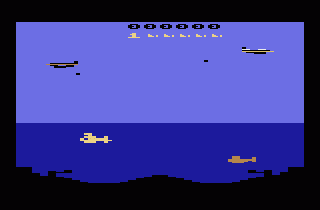 Get those bad Sean Connery accents ready,
folks, 'cuz it's time to take a trip to the bottom of the ocean
in a high powered, constantly hunted submarine. It's your
job to keep the sub seaworthy amidst a swarm of slow moving,
bomb dropping airplanes. Knock them out of the sky and a
faster, smarter jet arrives, diving around your shots and
unleashing deadly accurate guided missiles. If this
intense battle ends in your favor, you'll then navigate through an
underwater passageway strangely reminescent of the mesas in Raiders
of the Lost Ark, blasting neon colored mines on your way to the next
confrontation. You'll be surprised at how well all this turned
out on the 2600... the ships are a little chunky and the sound
effects are pretty irritating, but the gameplay's smooth and
responsive, and the whole nuclear-powered package is more complex
than your average 2600 shooter.
Get those bad Sean Connery accents ready,
folks, 'cuz it's time to take a trip to the bottom of the ocean
in a high powered, constantly hunted submarine. It's your
job to keep the sub seaworthy amidst a swarm of slow moving,
bomb dropping airplanes. Knock them out of the sky and a
faster, smarter jet arrives, diving around your shots and
unleashing deadly accurate guided missiles. If this
intense battle ends in your favor, you'll then navigate through an
underwater passageway strangely reminescent of the mesas in Raiders
of the Lost Ark, blasting neon colored mines on your way to the next
confrontation. You'll be surprised at how well all this turned
out on the 2600... the ships are a little chunky and the sound
effects are pretty irritating, but the gameplay's smooth and
responsive, and the whole nuclear-powered package is more complex
than your average 2600 shooter.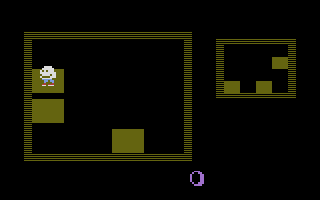 As the
name suggests, QB plays a little like Gottlieb's Q*Bert, but there's
a little inspiration from Locomotion as well. Your character
has to arrange tiles in a room to match the pattern on the right
hand side of the screen. Like Q*Bert, he can leap from tile to
tile, but QB can also slide tiles around if there's no place for him
to jump (a little like Locomotion). You'll have to come up
with the best combination of sliding and jumping to finish the
pattern, because if you're not careful you could put a tile in the
proper place, but isolate it from the others which still need to be
moved around. Also, there's a time limit on each pattern... if
you spend too much time thinking and not enough moving, a new random
pattern will be chosen, spoiling your work (this can be very
frustrating if you've got just one tile to move into place, but can
also help you if you can't figure out how to finish the pattern).
As the
name suggests, QB plays a little like Gottlieb's Q*Bert, but there's
a little inspiration from Locomotion as well. Your character
has to arrange tiles in a room to match the pattern on the right
hand side of the screen. Like Q*Bert, he can leap from tile to
tile, but QB can also slide tiles around if there's no place for him
to jump (a little like Locomotion). You'll have to come up
with the best combination of sliding and jumping to finish the
pattern, because if you're not careful you could put a tile in the
proper place, but isolate it from the others which still need to be
moved around. Also, there's a time limit on each pattern... if
you spend too much time thinking and not enough moving, a new random
pattern will be chosen, spoiling your work (this can be very
frustrating if you've got just one tile to move into place, but can
also help you if you can't figure out how to finish the pattern).
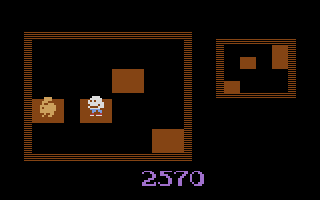 With
regards to the game's overall quality, I think QB compares favorably
to the better 2600 games released in 1983, although I wouldn't go
nuts and pit it against the truly incredible titles released for the
VCS in the late 80's (heck, some NES games weren't as good as
Solaris and Midnight Magic!). The graphics are alternately
functional and fantastic... the tiles are, well, flat colored
squares, but the fruit looks tempting (which is saying a lot from a
guy who doesn't eat much fruit) and the main character, whatever he
is, is very well detailed and animated... he'll even blink from time
to time if he's standing still. As for sound, well, there
isn't much in the game, but that's probably a wise decision on Mr.
Davies' part... I don't know how well the 2600's raw, harsh sound
output would have worked with a cute game like this. Finally,
there's the gameplay, which is entirely on target... except for
attacking enemies. You have to aim for the hostile hopper with
the joystick while pressing fire, meaning that you'll leap right at
him. Usually, the bad guy is tossed off the board, but if
not...
With
regards to the game's overall quality, I think QB compares favorably
to the better 2600 games released in 1983, although I wouldn't go
nuts and pit it against the truly incredible titles released for the
VCS in the late 80's (heck, some NES games weren't as good as
Solaris and Midnight Magic!). The graphics are alternately
functional and fantastic... the tiles are, well, flat colored
squares, but the fruit looks tempting (which is saying a lot from a
guy who doesn't eat much fruit) and the main character, whatever he
is, is very well detailed and animated... he'll even blink from time
to time if he's standing still. As for sound, well, there
isn't much in the game, but that's probably a wise decision on Mr.
Davies' part... I don't know how well the 2600's raw, harsh sound
output would have worked with a cute game like this. Finally,
there's the gameplay, which is entirely on target... except for
attacking enemies. You have to aim for the hostile hopper with
the joystick while pressing fire, meaning that you'll leap right at
him. Usually, the bad guy is tossed off the board, but if
not...  Reactor is intense, unique, and surprisingly
complex, but the one thing about this game that truly makes it
memorable is its wild heavy metal soundtrack. It's the kind of music
that you'd imagine Beavis and Butthead playing air guitar and
thrashing their oversized heads to, which is especially ironic since
Reactor preceeds them by nearly a decade...
Reactor is intense, unique, and surprisingly
complex, but the one thing about this game that truly makes it
memorable is its wild heavy metal soundtrack. It's the kind of music
that you'd imagine Beavis and Butthead playing air guitar and
thrashing their oversized heads to, which is especially ironic since
Reactor preceeds them by nearly a decade...  Here's a deliciously sadistic concept!
You're trapped inside a cramped room filled with dangerous beasts
and whirling blades. However, what's inside the room isn't
quite as threatening as what's outside it. Windows in
the walls slide open to reveal snipers eager to use you as target
practice. Your only hope for survival is to fire a few shots
of your own into the windows before they close, nailing the snipers
before they can draw a bead on you. It's an idea that's almost
as good in practice as it is in theory, but there are two things
holding it back. The first is that the graphics and sound
really suck. Your hero looks like the spawn of the Bic mascot
and the Pillsbury Dough Boy, and those dangerous animals mentioned
earlier never get more intimidating than that sickly iguana
at the local pet store. Rather than bursts of gunfire and
loud, jaw-rattling explosions, you're served up a random assortment
of stock sound effects that don't really fit the context of the
game. Oh yeah, then there's that other thing... mind-numbing
repetition. Once you've seen the first three rooms, you've
seen them all. The snipers never get any smarter and
there aren't any surprises to keep you on the edge of your seat;
just new sprites for the hungry monsters.
Here's a deliciously sadistic concept!
You're trapped inside a cramped room filled with dangerous beasts
and whirling blades. However, what's inside the room isn't
quite as threatening as what's outside it. Windows in
the walls slide open to reveal snipers eager to use you as target
practice. Your only hope for survival is to fire a few shots
of your own into the windows before they close, nailing the snipers
before they can draw a bead on you. It's an idea that's almost
as good in practice as it is in theory, but there are two things
holding it back. The first is that the graphics and sound
really suck. Your hero looks like the spawn of the Bic mascot
and the Pillsbury Dough Boy, and those dangerous animals mentioned
earlier never get more intimidating than that sickly iguana
at the local pet store. Rather than bursts of gunfire and
loud, jaw-rattling explosions, you're served up a random assortment
of stock sound effects that don't really fit the context of the
game. Oh yeah, then there's that other thing... mind-numbing
repetition. Once you've seen the first three rooms, you've
seen them all. The snipers never get any smarter and
there aren't any surprises to keep you on the edge of your seat;
just new sprites for the hungry monsters.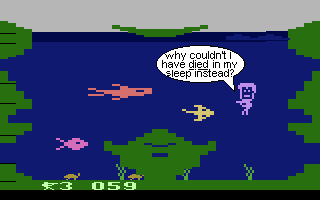

 This kind of reminds me of an elevated
side-view version of Pitfall! on a skateboard. The big difference is
that the playfield is much larger (with a map that extends in four
directions as opposed to Pitfall!'s two) and instead of collecting
treasures, your character must perform stunts within the alloted
time. It's very difficult to do this- I've only been able to perform
twenty of the thirty stunts in the eight minutes given- and the
music is out of place (it sounds more like something from an early
60's sitcom than your typical shredder soundtrack from the late
80's) but Skateboardin' is still a pretty decent effort, considering
the limitations of the system.
This kind of reminds me of an elevated
side-view version of Pitfall! on a skateboard. The big difference is
that the playfield is much larger (with a map that extends in four
directions as opposed to Pitfall!'s two) and instead of collecting
treasures, your character must perform stunts within the alloted
time. It's very difficult to do this- I've only been able to perform
twenty of the thirty stunts in the eight minutes given- and the
music is out of place (it sounds more like something from an early
60's sitcom than your typical shredder soundtrack from the late
80's) but Skateboardin' is still a pretty decent effort, considering
the limitations of the system.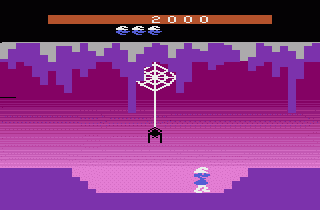 The control is a little hard to get the hang of
(since you have to press up to jump, and the joystick button does
nothing), but once you adjust you'll find that Smurf is one of
Coleco's better 2600 titles. The graphics are blindingly colorful,
and there's a nice difficulty ramp for seasoned players (in fact, it
gets a little too hard after you've saved Smurfette twice...
the enemies all get a turbo boost, and you have to repeat each round
multiple times to move on to the next one). The tunes are a little
rough, but that's a minor complaint. In fact, rough music is better
than the usual 2600 alternative (no music at all)...
The control is a little hard to get the hang of
(since you have to press up to jump, and the joystick button does
nothing), but once you adjust you'll find that Smurf is one of
Coleco's better 2600 titles. The graphics are blindingly colorful,
and there's a nice difficulty ramp for seasoned players (in fact, it
gets a little too hard after you've saved Smurfette twice...
the enemies all get a turbo boost, and you have to repeat each round
multiple times to move on to the next one). The tunes are a little
rough, but that's a minor complaint. In fact, rough music is better
than the usual 2600 alternative (no music at all)...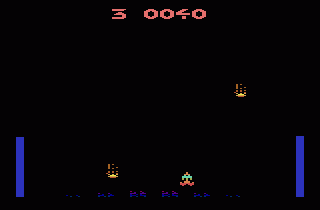 Yeesh. Another mediocre blastathon on the 2600.
Just what I needed. What's most disappointing about this mess is the
fact that it was designed by Imagic, the company responsible for
such groundbreaking titles as Demon Attack and Atlantis. Solar Storm
has elements of both (the perspective is similar to Demon Attack's,
and you must protect your planet from enemies a'la Atlantis), but
the mixture of themes just doesn't work here. Does it have something
to do with the ho-hum graphics? The prefunctory bonus round? The
fact that there's no way to dodge the enemies' laser blasts? Or
Dennis Koble's insistance on making the game paddle compatible?
Well, whatever it is, the game's not much fun, so pass it
up.
Yeesh. Another mediocre blastathon on the 2600.
Just what I needed. What's most disappointing about this mess is the
fact that it was designed by Imagic, the company responsible for
such groundbreaking titles as Demon Attack and Atlantis. Solar Storm
has elements of both (the perspective is similar to Demon Attack's,
and you must protect your planet from enemies a'la Atlantis), but
the mixture of themes just doesn't work here. Does it have something
to do with the ho-hum graphics? The prefunctory bonus round? The
fact that there's no way to dodge the enemies' laser blasts? Or
Dennis Koble's insistance on making the game paddle compatible?
Well, whatever it is, the game's not much fun, so pass it
up. Here's a
fun fact for you! The Atari hit Yars' Revenge was originally
envisioned as a port of the Cinematronics arcade game Star Castle.
However, when faced with the limitations of the 2600 hardware,
Howard Scott Warshaw took the game in another direction, and a
classic was born. 20th Century Fox and Sirius Software weren't as
easily deterred, though... in true Obama fashion, they shouted "Yes
we can!" and forged ahead with a game that more closely approximates
the action of Star Castle. It even improves on it in some respects,
giving the fortress in the center of the screen a wider assortment
of enemies to throw at you along with an energy field that contracts
and expands, often threatening to crush you against the edges of the
screen. However, some of these enhancements are less welcome than
others. The Spacemaster has a fuel gauge which replenishes over
time, so sinking a single lucky shot into its core isn't enough to
destroy it... you'll have to hammer the fortress with laser fire
until it grudgingly admits defeat. That's not a problem in the
earlier stages, but in the later ones, where aliens flow from the
center of the screen like water and the flimsy energy shield is
reinforced by impenetrable walls, you're going to be locked in
combat with the Spacemaster for an extra, extra, extra long time.
Better bring along some of that
Here's a
fun fact for you! The Atari hit Yars' Revenge was originally
envisioned as a port of the Cinematronics arcade game Star Castle.
However, when faced with the limitations of the 2600 hardware,
Howard Scott Warshaw took the game in another direction, and a
classic was born. 20th Century Fox and Sirius Software weren't as
easily deterred, though... in true Obama fashion, they shouted "Yes
we can!" and forged ahead with a game that more closely approximates
the action of Star Castle. It even improves on it in some respects,
giving the fortress in the center of the screen a wider assortment
of enemies to throw at you along with an energy field that contracts
and expands, often threatening to crush you against the edges of the
screen. However, some of these enhancements are less welcome than
others. The Spacemaster has a fuel gauge which replenishes over
time, so sinking a single lucky shot into its core isn't enough to
destroy it... you'll have to hammer the fortress with laser fire
until it grudgingly admits defeat. That's not a problem in the
earlier stages, but in the later ones, where aliens flow from the
center of the screen like water and the flimsy energy shield is
reinforced by impenetrable walls, you're going to be locked in
combat with the Spacemaster for an extra, extra, extra long time.
Better bring along some of that 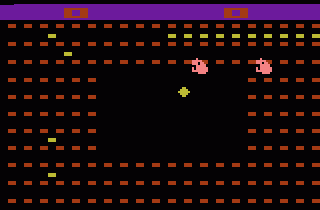 Space Zap and
Centipede... two great tastes that taste great together? Not if Data
Age has anything to say about it! Sssnake traps you in a simple maze
patrolled by strings of dots, which could only be charitably
described as snakes. You've got to blast the primitive pythons as
they weave their way through the maze, but you're anchored to the
center of the screen, only allowed to circle its edges like a crazed
Rottweiler on a chain. The woeful collision detection only adds to
the frustration... chances are, you're not going to be able to hit a
single segment of snake unless you set yourself directly in its
path. What's your reward for this act of borderline suicidal
heroism? Absolutely nothing. For some unfathomable reason, there's a
single digit score and you only earn points from blasting the
gape-jawed monsters that wander through the maze. If they're the
only target in this game that matters, shouldn't it be called
MMMonsters? Better yet, maybe that title should be reserved for the
blackhearted designers, who took the allowances from hundreds of
unsuspecting children and gave them this steaming load in
return.
Space Zap and
Centipede... two great tastes that taste great together? Not if Data
Age has anything to say about it! Sssnake traps you in a simple maze
patrolled by strings of dots, which could only be charitably
described as snakes. You've got to blast the primitive pythons as
they weave their way through the maze, but you're anchored to the
center of the screen, only allowed to circle its edges like a crazed
Rottweiler on a chain. The woeful collision detection only adds to
the frustration... chances are, you're not going to be able to hit a
single segment of snake unless you set yourself directly in its
path. What's your reward for this act of borderline suicidal
heroism? Absolutely nothing. For some unfathomable reason, there's a
single digit score and you only earn points from blasting the
gape-jawed monsters that wander through the maze. If they're the
only target in this game that matters, shouldn't it be called
MMMonsters? Better yet, maybe that title should be reserved for the
blackhearted designers, who took the allowances from hundreds of
unsuspecting children and gave them this steaming load in
return. C'mon, you
know you love Star Trek. In fact, if you're any sort of
self-respecting Internet nerd, you probably love it a little
too much, the way Shatner loves himself or Takei loves that
stumpy little Jewish guy he married. That's all right, though...
you're in good company. I firmly believe that Star Trek is one of
the most compelling franchises in the history of television, and
that high quality shines through in Strategic Operations Simulation.
Based loosely on strategy games designed for home computers in the
late 1970s, SOS puts you on a mission to defend space stations from
fleets of Klingon warships. The player can dock with a station to
restock his ship with shields, warp energy, and devastating photon
torpedoes, but resisting that temptation earns the player a huge
point bonus after cleaning up the Klingons in a sector. This element
of risk and reward adds variety to the gameplay, as does navigating
through asteroid belts for free power-ups and confronting the
mine-dropping artificial intelligence NOMAD. Compared to other ports
on beefier consoles, SOS is remarkably uncompromised... not only is
the core gameplay preserved, but the unique split-screen display and
snippets of the original Star Trek theme music are here as well.
Let's face it, we Trekkies are a demanding bunch, but this game
easily justifies our love.
C'mon, you
know you love Star Trek. In fact, if you're any sort of
self-respecting Internet nerd, you probably love it a little
too much, the way Shatner loves himself or Takei loves that
stumpy little Jewish guy he married. That's all right, though...
you're in good company. I firmly believe that Star Trek is one of
the most compelling franchises in the history of television, and
that high quality shines through in Strategic Operations Simulation.
Based loosely on strategy games designed for home computers in the
late 1970s, SOS puts you on a mission to defend space stations from
fleets of Klingon warships. The player can dock with a station to
restock his ship with shields, warp energy, and devastating photon
torpedoes, but resisting that temptation earns the player a huge
point bonus after cleaning up the Klingons in a sector. This element
of risk and reward adds variety to the gameplay, as does navigating
through asteroid belts for free power-ups and confronting the
mine-dropping artificial intelligence NOMAD. Compared to other ports
on beefier consoles, SOS is remarkably uncompromised... not only is
the core gameplay preserved, but the unique split-screen display and
snippets of the original Star Trek theme music are here as well.
Let's face it, we Trekkies are a demanding bunch, but this game
easily justifies our love.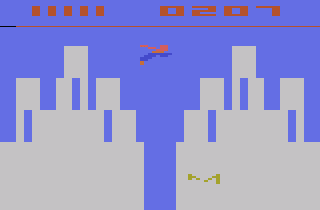 If anything could be best described as a
side-view version of Adventure, this would be it. Superman has that
unmistakable Adventure feel despite the change in perspective... the
action is centered largely around dropping and dragging objects, and
the artwork (although slightly more detailed) bears a resemblence to
Warren Robinette's work in the first video game RPG. The formula
just isn't as successful here as it was in Adventure, however... the
background colors were poorly chosen, and Superman's powers are
somewhat underwhelming. Sure, he can fly, and carries around
everything from Lois Lane to helicoptors with the greatest of ease,
but he never actually gets into fights with the numerous gun-toting
thugs that populate Metropolis, and his X-ray vision is limited to
previewing screens directly adjacent to him. And that aside, once
you've beaten the game, there's no point in playing it again except
to beat your best times.
If anything could be best described as a
side-view version of Adventure, this would be it. Superman has that
unmistakable Adventure feel despite the change in perspective... the
action is centered largely around dropping and dragging objects, and
the artwork (although slightly more detailed) bears a resemblence to
Warren Robinette's work in the first video game RPG. The formula
just isn't as successful here as it was in Adventure, however... the
background colors were poorly chosen, and Superman's powers are
somewhat underwhelming. Sure, he can fly, and carries around
everything from Lois Lane to helicoptors with the greatest of ease,
but he never actually gets into fights with the numerous gun-toting
thugs that populate Metropolis, and his X-ray vision is limited to
previewing screens directly adjacent to him. And that aside, once
you've beaten the game, there's no point in playing it again except
to beat your best times.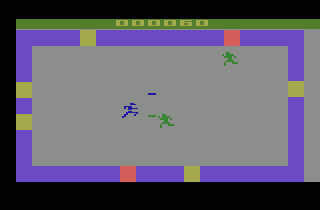 The Intellivision favorite comes to the Atari
2600, faster and easier to play than ever... yet also more
boring. Could the blame lie with the unappealing visuals,
consisting of dumbed down Running Men pasted on a plain grey
box? Could it be the lack of variety in the enemies?
Rather than several kinds of rogue programs, each with a different
level of artificial intelligence and resistance to attack, you get
an endless wave of digital dummies who fall with a single strike of
your disc. Could it be the greatly simplified battle
system? You can't shield yourself with your flourescent
frisbee like you could in the film... your only option is to
attack. Could it be the omission of the towering
Recognizer, which marked the end of each stage and added extra
challenge to the gameplay in the Intellivision version?
Whatever it is, you won't be able to shake the feeling that you're
getting cheated out of the full Deadly Discs experience, including
much of the fun.
The Intellivision favorite comes to the Atari
2600, faster and easier to play than ever... yet also more
boring. Could the blame lie with the unappealing visuals,
consisting of dumbed down Running Men pasted on a plain grey
box? Could it be the lack of variety in the enemies?
Rather than several kinds of rogue programs, each with a different
level of artificial intelligence and resistance to attack, you get
an endless wave of digital dummies who fall with a single strike of
your disc. Could it be the greatly simplified battle
system? You can't shield yourself with your flourescent
frisbee like you could in the film... your only option is to
attack. Could it be the omission of the towering
Recognizer, which marked the end of each stage and added extra
challenge to the gameplay in the Intellivision version?
Whatever it is, you won't be able to shake the feeling that you're
getting cheated out of the full Deadly Discs experience, including
much of the fun. I've given Wizard of Wor a high rating because
it's a solid conversion of an excellent arcade title... but to
be perfectly honest, I have mixed feelings about this particular
version of the game. It's flickery beyond belief, the
characters are both dully colored and blocky, and all of the text
messages were removed. Even on the 2600, I have to believe
that a better translation of Wizard of Wor could have been
possible. On the plus side, the game plays really well and
gets just as intense as the better versions available on the 5200
and Bally Astrocade... and you can even play with a friend, a luxury
that many gamers had to do without when arcade titles
were converted to the more powerful
NES.
I've given Wizard of Wor a high rating because
it's a solid conversion of an excellent arcade title... but to
be perfectly honest, I have mixed feelings about this particular
version of the game. It's flickery beyond belief, the
characters are both dully colored and blocky, and all of the text
messages were removed. Even on the 2600, I have to believe
that a better translation of Wizard of Wor could have been
possible. On the plus side, the game plays really well and
gets just as intense as the better versions available on the 5200
and Bally Astrocade... and you can even play with a friend, a luxury
that many gamers had to do without when arcade titles
were converted to the more powerful
NES.